July 26 - August 1, 2015: Issue 224
130th Anniversary of Australia’s Sudan Contingent - Local Connections

'Well done N.S.W. God speed': [departure of New South Wales Contingent for Sudan war from Circular Quay], 3 March 1885, Image No.:a1528402, courtesy State Library of NSW.
130th Anniversary of Australia’s Sudan Contingent
These ‘Soudan’ men were the first volunteer Australian troops to go overseas, and were Australia's first returned servicemen - preceding those who went to the Boer War and the First World War by many years.
Having read some of these reports during past research activities, especially finding threads of this Service mentioned while following Captain Hixson’s path a fair while after he first trod it, there are of course local gentlemen and members of our own community who had relatives among the ten thousand Australians who went to serve in this conflict.
Tom Gunning, sports writer of this period, who was also one of the founding members of Manly Surf Life Saving Club, served in The Soudan Contingent.
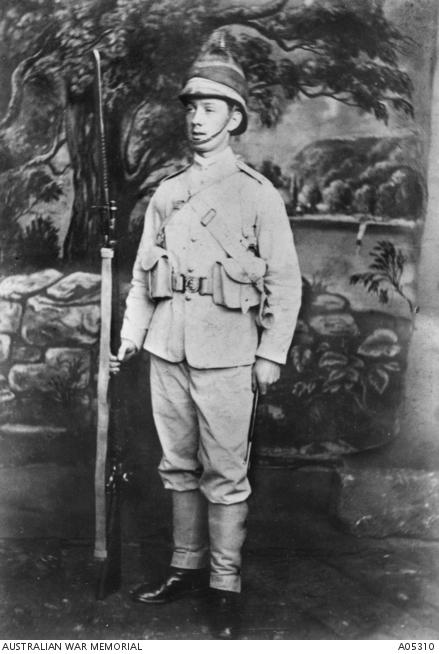
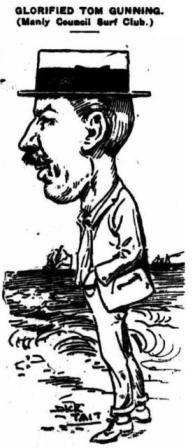 GLORIFIED TOM GUNNING.
GLORIFIED TOM GUNNING.(Manly Council Surf Club.)
Tom Gunning loves his daily dip,
He is a free-and-easy cuss.
Down amongst the waves you'll see him trip,'
In fact, he's quite amphib-i-yuss.
A long cool sherbet he can drink,
He's stylish in his tog, is he;
Re sport, he’s shed great pots of ink,
Behold the great ‘Authoree’!
Faith, Tom can swim — his 'eart is brave,
The other night a mermaid he
Plunged in and rescued from the wave.
And purchased immortalitee.
You'll hear all people whisper now,
In tones of awe and pride, '
'That's him!' as Tom now does the beach,
‘Who saved the surfing bride’.
GLORIFIED TOM GUNNING. (1909, February 10). Sydney Sportsman (Surry Hills, NSW : 1900 - 1954), p. 5. Retrieved from http://nla.gov.au/nla.news-article166734303
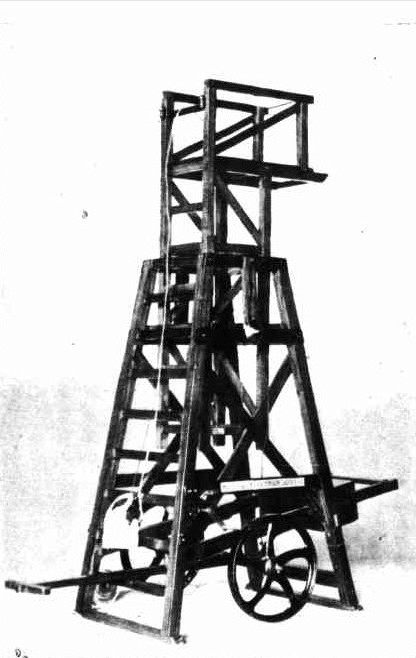 A MISCELLANY : Life-saving Contrivance. MODEL OF TOWER FOR LIFE-SAVING PURPOSES, DESIGNED BY MR. T. GUNNING, FOR BEACH USE.
A MISCELLANY : Life-saving Contrivance. MODEL OF TOWER FOR LIFE-SAVING PURPOSES, DESIGNED BY MR. T. GUNNING, FOR BEACH USE. HEREWITH we illustrate an apparatus designed by' Mr. T. Gunning, of the Manly Surf Club Life-saving Brigade. The experience Mr. Gunning has gained on the Manly Beach has convinced him that the present means of rescuing people who have been carried out in the surf are crude, and are accompanied with serious risk to the rescuers. Chief among these is the interference which the lifesavers are subjected to from well-meaning bathers, whose actions, largely due to ignorance, frequently tend to hamper instead of help. A case in point was the fatality whereby William Thomas Flowerdew lost his life at Manly a few weeks ago. On that occasion the crowd rushed the line as usual, and made the blunder of hauling back Charles Purcell, the lifesaver, when he was within a few yards of the drowning man. Before the mistake could be rectified Flowerdew had collapsed, and sunk. This incident is typical of many that take place on every beach about Sydney. In Mr. Gunning's invention the line is worked from a wooden tower, kept near the water's edge, and is so carried clear of anyone on the beach when it is being taken out by the life-saver. It is proposed that the tower, which will be built of wood, shall be about eight or ten feet high, with an extension of another four feet if necessary. This extension is obtained by means of a small platform, which can be raised from the centre of the tower, and is worked by a small windlass in front. The line is coiled in a box at the back, and is taken over a roller at the back of the platform, across to the front, over another roller, and thence to the belt. At the end of the line in the box is a hook and swivel, the same as at the belt end, so that in the event of all the line being taken out another line could be attached instantly. The tower is placed on wheels, with broad, flat, light tyres, to enable it to be moved quickly to any part of the beach. When in position the wheels are off the ground. The tower is built on broad, flat pieces of timber to prevent it sinking into the sand.
To bring the wheels on to the sand, so that the tower can be moved to another part of the beach, the main uprights at the back are hinged a couple of feet from the bottom, but when stationary this portion is kept firmly in position by iron bolts, which can be easily drawn. In front there is a pole with a cross-bar for the purpose of pulling it. The pole is close to the ground, and when the tower is to be moved the rear part on the hinges falls back, the machine rests on the wheels, thereby raising the front portion sufficiently to keep it clear of the sand while being moved. An alarm bell is at the side, to be rung when anyone is in difficulties and assistance required. In addition to keeping the line clear of the crowd the machine will enable the men working it from the tower to keep the belt man in view all the time, and thereby prevent the line being drawn in before he has reached the person in danger. It is also claimed that the line being manipulated from a height will be of considerable advantage in lifting rescuer and rescued up when being pulled in. The box at the rear has the line coiled in it, which the inventor considers is preferable to having a reel, on which the line frequently tangles, thereby necessitating a man always being at the brake when in use. A reel, however, can be attached if preferred. The model can be seen at Cole's Book Arcade in George-street.
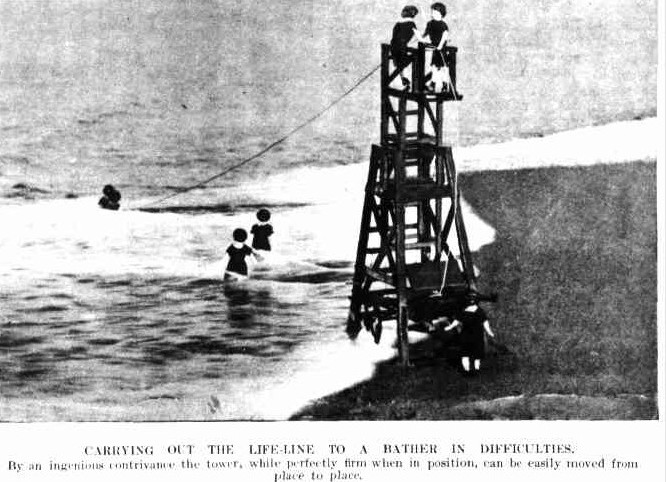
As Roger’s note came through at a time of the day when dinner was being planned, a particularly attractive thought process as both breakfast and lunch had once again been forgone in an effort to ‘get the Issue out on time’, Mr. Sayer once again sparked a ‘quick perusal’ of the voices of those who spoke then, and became yet another lengthy foray into historical investigations that serendipitously showed Australia’s Soudan Contingent were treated to a ‘Soudan Feast’ on July 28th, 1885, (perhaps to circumvent the adverse conditions of when they were first allowed to disembark and the constant rain that washed all over that ceremonial acknowledgement).
Food again arose through a nice little local legend about the naming of a lovely cove, which also demonstrated yet more interconnections. Although there is a preference to believe that ‘Forty Baskets Beach’ was named thus due to Manly people supplying the returned, and hungry troops, with forty baskets of fish, the beach had been named as such quite a while before this, nice as this story is, as this small item regarding a Regatta which features a fellow Brisbane Water/Central Coast gentleman who became a champion rower after George Mulhall – one James Punch (more on these early Pittwater/Broken Bay rowers in Spring 2015) iterates:
THE MANLY BEACH REGATTA.
Manly Beach may now be looked upon as an indubitably recognised place of amusement for the citizens of Sydney. On the occasion of most of the holidays and festive days that are kept by Australians this delightful spot has been selected by pleasure seekers ; and on each of such events we have found that Manly has obtained a steadily increasing reputation. Blending as it does all the beauties and advantages of a secluded sea side nook-of an all but land encompassed bay which the strongest breezes do but ruffle-of a magnificent const line within a few hundred yards of the landing place, upon whose rude and rugged cliffs and jutting headlands and long sandy beaches the ever rolling waters of the wide Pacific beats unceasingly, and of hills and dales and wild entangled bush wherein the stroller may fancy himself hundreds of miles in the far interior, if no careless laugh should reach his ear and break the spell of fancy-possessing all these then it is no wonder that the working men of Sydney-for we are all working men here-should select such a spot to relieve themselves from the care and turmoil of business, or to relax the muscles that have been strained and wearied by manual labour. The additional incitement of a regatta at all times, as we might almost say, " the" favourite amusement of our citizens, caused the presence of a more than usually large number of visitors, at Manly, yesterday; and as this had been anticipated every available steamboat in the harbour had been chartered for the occasion, leaving the Phoenix Wharf at intervals of half-an hour throughout the day. At each departure, these vessels were filled to the utmost of their capacity, and as a matter of course, towards the middle of the day, Manly presented a scene of more than ordinary holiday gaiety. Bands of music, and of course the accompanying dance, were placed in different positions, tea gardens with the usual attendant amusements, and numerous booths for the sale of refreshments, provided occupation for very many; but by far the larger proportion of the visitors started off for Big Manly, scattering themselves over the sands on the rocky headlands that keep back the mighty ocean. Of course, as the regatta was the main attraction of the day, a very large number of persons lined the beach to witness the different sports, but the continuous arrival of steamers with their loads of visitors materially marred the enjoyment of those on shore by checking the continuity of sight that is so much desired by the aquatic amateur. The chief races of interest were the pulling matches, some of our crack Sydney pullers being pitted against a Melbourne waterman, who has recently gained some laurels here by heating Punch, and who has since been matched to pull against the champion, R. Green. We are glad to say that, notwithstanding the crowding into and out of the steamers, no accident occurred ; and that during the time we were present we did not witness one exhibition of ill-feeling.
The races came off in the following order;
First Race.-To start at 12 o'clock. For all youths under twenty years of age, in dingies, pulling a pair of sculls ; no outriggers allowed. First prize,£5 ; second, £1. Entrance 10s. 6d. Course-From the flag-boat in, Manly, round the flag-boat off " Forty Basket " Beach, and back to starting place.
ENTRANCES.
Star .......James Boyd ....... Pink and blue ...... 1 Lily of St. Leonard's. Peter Ellery ......Dark blue .....2 Rose .W. Deloitte ..... Pink and white...... The Stranger ......George Mulhall......Light blue The Messenger ............. John Dunlop ....Red Jenny Lang......A. M'Neil ......White
The boats made an excellent start, and kept well together for the first two hundred yards, Dunlop then obtained a slight lead, with Boyd second, and Ellery third, but before rounding the first flag-boat, Boyd had passed Dunlop, and obtained a good lend, and within the next hundred yards Ellery also had drawn on Dunlop, and after an excellent race passed lum, taking second place, Boyd winning with ease.
Second Race.-For all watermen in bona fide working boats, that have been plying for hire during the lost three months. First prize, £10 ; second, £2.Entrance, 10s. 6d. Course-From flag-ship in Manly, round a flag-boat off " Forty-Basket " Beach, thence round a flag-boat near Dobroyd Point, back to the starting boat.
Entrances.
Terror .......... H. White .... Black .... 1 Prince Albert... George Nash.... Blue and red.... 2 Lucy Campbell..... Richard Green ... Blue, with star ... 3 Monte Christo... George Mulhall... Light blue with red cross.... 4 Lizzy .....Patrick Connelly.... Blue and whlte... . 5
The meeting of R. Green and White in heavy boats was a matter of considerable interest to the spectators, and a tremendous struggle took place from the start between these two men, the others being soon thrown out of any chance of winning. Green kept a slight lead for half a mile, when White drew on him, and in a few moments took first place, which he maintained to the finish. After rounding the second boat, Nash, who had been pulling well throughout, gradually gained on Green also, and succeeded, to the surprise of every one, in passing him, thus securing the second prize. The boats came in as follows-White first, Nash second, Green third, Mulhall fourth, Connolly last.
Third Race.-For all sailing dingies not exceeding twelve feet on the keel. First prize, £5 ; second, £1.Entrance, 10s. 6d,
ENTRANCE.
Foig-a-ballagh......Robert Yeend ......Green
There being only one entrance, there was no race.
Fourth Rack.-For all second-class yachts. First prize, £15 ; second, £5. Entrance, £2 2s. Course From flag-ship in in Manly, round the light-ship and Sow and Pigs, back to flag-ship ; twice over.
ENTRANCES.
Emma........... M. P. Josephson ...... Blue with crest Gitana .....W. M'Quade ...... Blue peter Blue Bell.... W. Watson .....Green and white.
The Emma got the start, and won by a considerable distance ; Blue Bell second, although she carried away her throat halyards soon after starting. The breeze was too light to test the quality of sailing boats.
Fifth Race.-The grand match of the day for all men in wager boats, pulled by sculls. First prize,£25 ; second, £5. Entrance, £1 Is. Course-Same as second.
Entrances, Electric Spark. James Punch .... White .... . 1 Old Joe.... . H. White..... . Black ..... 2 William Prescott ... Thomas Day ... Red.... 3 Star of Peace. James Green . Pink and blue.
Perhaps three better pullers never started than Punch, White, and Day. The result of the late match naturally pointed out White as the probable winner; but from the style of Punch's pulling, showed that either his condition, or some other cause, had considerably improved him. He took the lead from the start, was never pushed, and won with ease. Day kept second place for half the distance, when he was collared and passed by White, who came in second. J. Green gave up.
Seventh Race - For all bona fide watermen's boats, pulled by a pair of oars, that have been plying for hire during the last three months. First prize, £10 ; second, £2. Entrance, 10s. 6d. Course-Same as second race.
Entrances.
Electric. T. Day and H. White. . Black Edith . J. Punch and R. Green.... White Lizzie Green . G. Green and J. Green. Blue.
This was the finest race of the day, and, from first to last, was pulled with a pluck and determination to win that could not be excelled. At the start. Lizzie Green took the lead, with Edith second, and Electric close alongside. In this order they pulled the first mile, when Lizzie Green dropped astern. In rounding the first flagboat, Edith, having a slight lead, fouled the Electric, but got clear again almost immediately. In pulling for the second flagboat, Electric pulled clean up to the Edith, and would have passed her, but a foul again took place, apparently from the Edith refusing to give place ; on getting clear, Edith still kept the lead, and, although pushed hard by the Electric, came in first by half a boat's length. A protest was handed in by White and Day.
Sixth Race.-A private match was made between three boats pulling two pair of paddles, which, after a splendid race was won by the Prince Albert.
Seventh Race.-Two gigs and two dingies, to start at the same time - twenty minutes time allowed. Prize, £3 each. Entrance, 6s.
Dingy-Rose ... .W. Deloitte... .Pink and white Gig-Undaunted....Edward Chisholm... White and red Second dingy-Pet of Manly..... Harry Whalan ....Blue Second gig-Mary.....W. Mileswater .....Red.
The dingy in one event and the gig in the other, carrying off the prizes. THE MANLY BEACH REGATTA. (1859, May 25). The Sydney Morning Herald (NSW : 1842 - 1954), p. 4. Retrieved from http://nla.gov.au/nla.news-article13025355
And a mention of fish to be supplied to these hungry men:
Return of the Contingent
ARRIVAL OF THE ARAB.'HOME, SWEET HOME. IN QUARANTINE. THE SICK LIST.
The troopship Arab, conveying the New South Wales Contingent, entered the Heads at about II o'clock last night, and was placed in quarantine. No communication will be permitted with the troops, who will be landed at the quarantine grounds, where preparations have been made for their reception. Fifty men of the Permanent Force were engaged on Friday in filling the mattresses with straw, arrangements having been made by the Brigade Office with Mr. James Kidman, the well-grown grocer, sufficient groceries have already been forwarded to the station to last till Tuesday. Bread and meat will be supplied daily. As already mentioned, arrangements have been made by the Postmaster General for the conveyance of letters and newspapers to and from the Quarantine Station. Some of the residents of Manly Beach have contributed to a fund, and intend to put on board the Arab as much fish as can be obtained. Mr. C. A. Benbow is the acting secretary and treasurer.
The Governor Lord Augustus Loftus will entertain the representatives of the neighboring colonies at dinner, on Tuesday next. The Ministry will give a dinner to these gentlemen and the officers of the Contingent, on Thursday. Mr. Le Mesurier has been temporarily appointed Quarter-master, and the directions of the acting Commandant have been carried out very completely for the accommodation of the Contingent at the Quarantine Station. From our special correspondent on board the troopship, we have received the following notes:—
DISEMBARKATION.
When this happy event transpires the men will, attired in their khakee suits, and spire-protecting brown pith helmets with pugarees, and, beside the ordinary accoutrements, will carry their water bottles slung over their shoulders. Orders have been issued by the Commandant that all cheering is to cease as soon as the 'halt ' is sounded, and he has especially enjoined the men in brigade orders, both on and after landing, to continue to conduct themselves as good soldiers, and in a manner calculated to sustain the honor of the colony and the good reputation they have earned for themselves by their services in the Soudan. Return of the Contingent. (1885, June 20). Evening News(Sydney, NSW : 1869 - 1931), p. 4. Retrieved from http://nla.gov.au/nla.news-article111018516
Australia’s resolve to send a contingent to then spelled ‘Soudan’ became about fighting slavery from one point of view, and evacuating English subjects who were serving in the conflict zone that gave this insight that slavery was rife. Other records indicate a fervent desire, refuted by others living here then, to show Australia was well and truly capable of serving the Mother Country by being able to provide such support.
Another factor was the esteem in which one of the British representatives was held. Major-General Charles George Gordon, CB, an apparently passionate anti-slave advocate, was killed in Khartoum trying to defend people and anti-slave ideals, something that would have meant a lot to many generations of children of convicts.
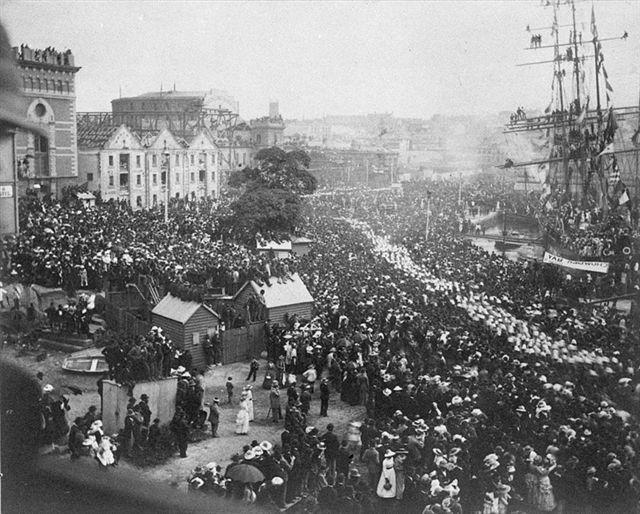 Departure of New South Wales Troops for Egypt.
Departure of New South Wales Troops for Egypt.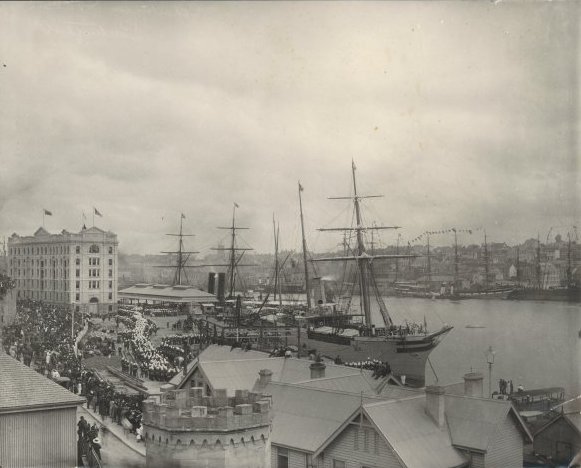 The column moved along Park, George, and Hunter Streets and Macquarie Place. The men of the contingent bore the parting ceremonies very well, although more than one brave fellow's voice grew husky as he took a farewell embrace of some loved friend. In
The column moved along Park, George, and Hunter Streets and Macquarie Place. The men of the contingent bore the parting ceremonies very well, although more than one brave fellow's voice grew husky as he took a farewell embrace of some loved friend. In 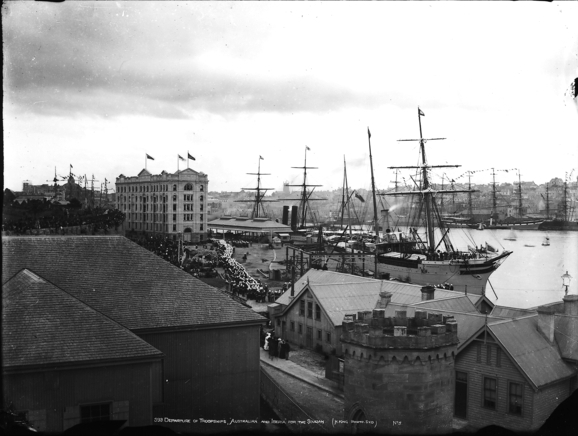
Above: Ships departing for the Sudan with troops, March 3rd, 1885. Henry King Image courtesy Powerhouse Museum.
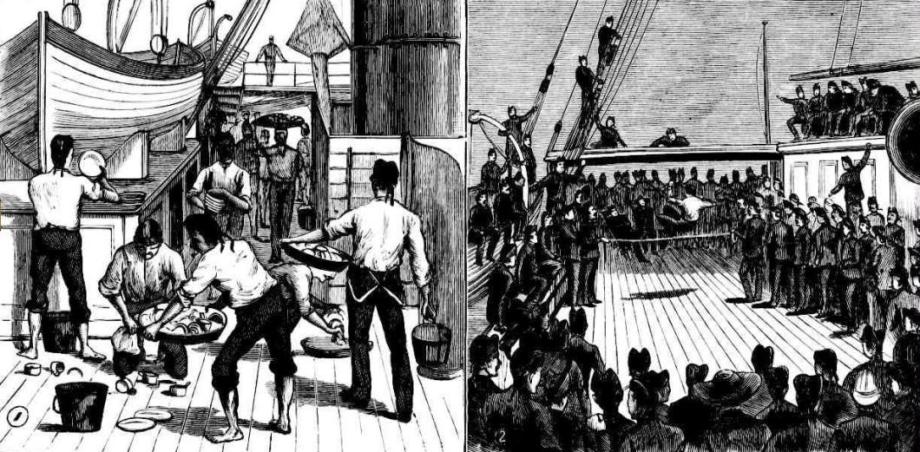
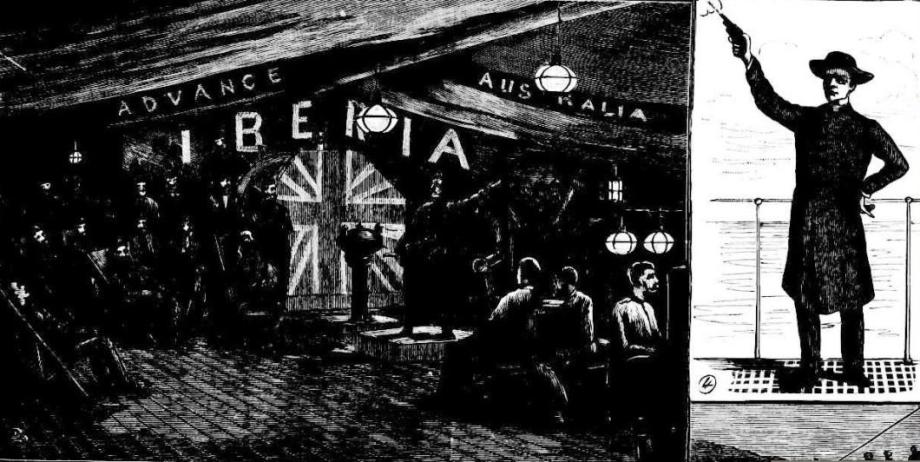
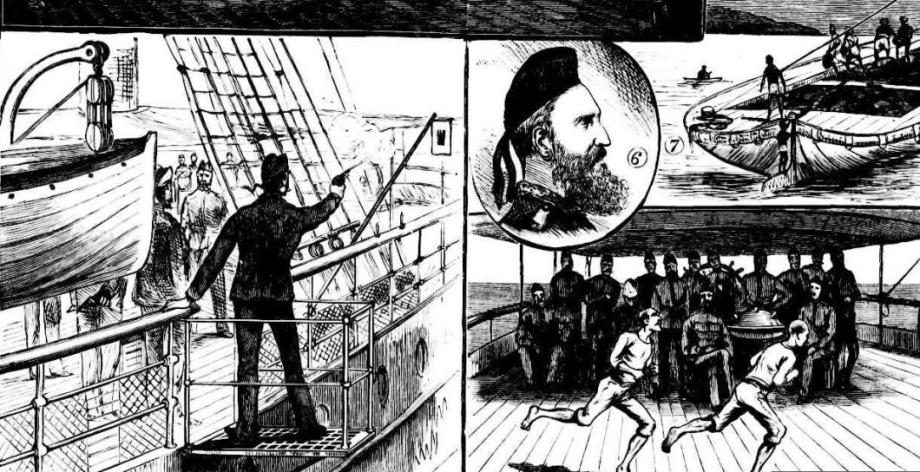
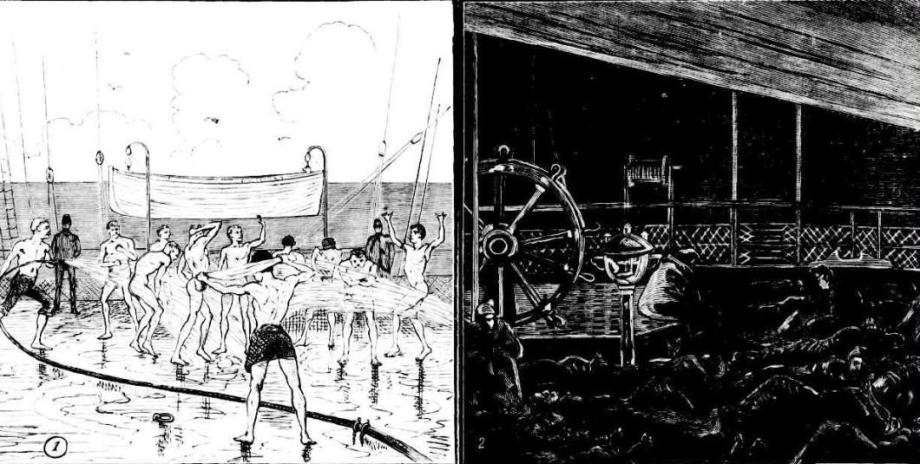
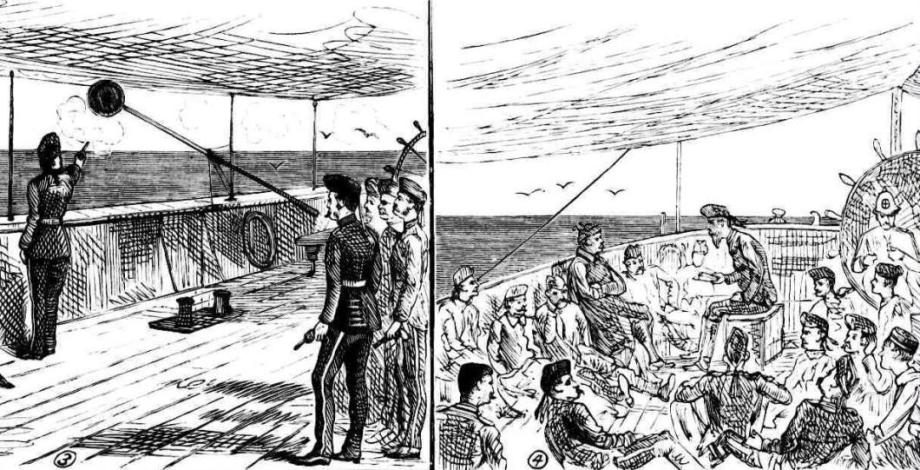
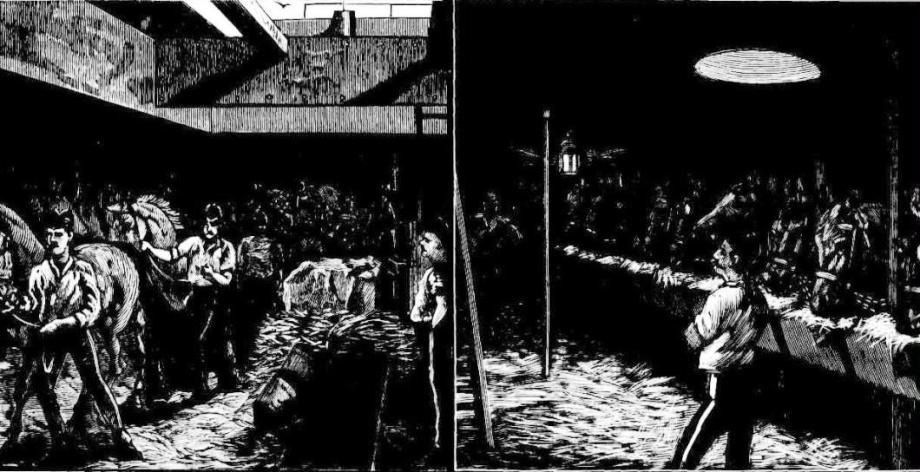
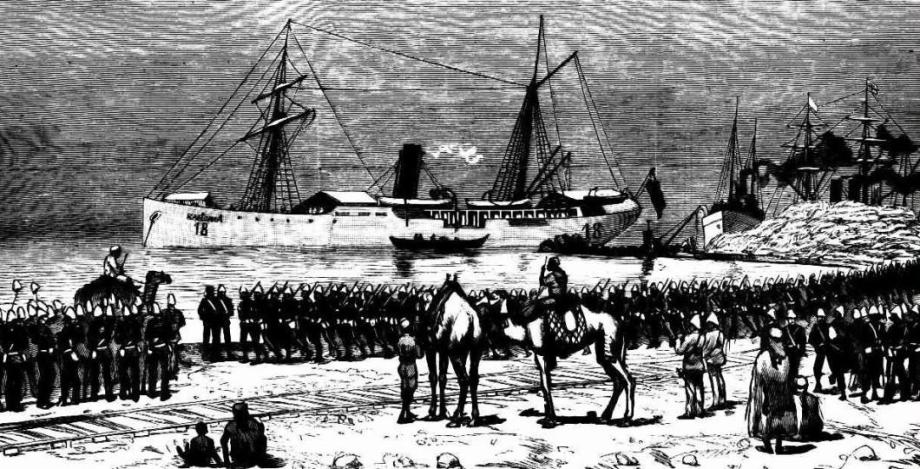
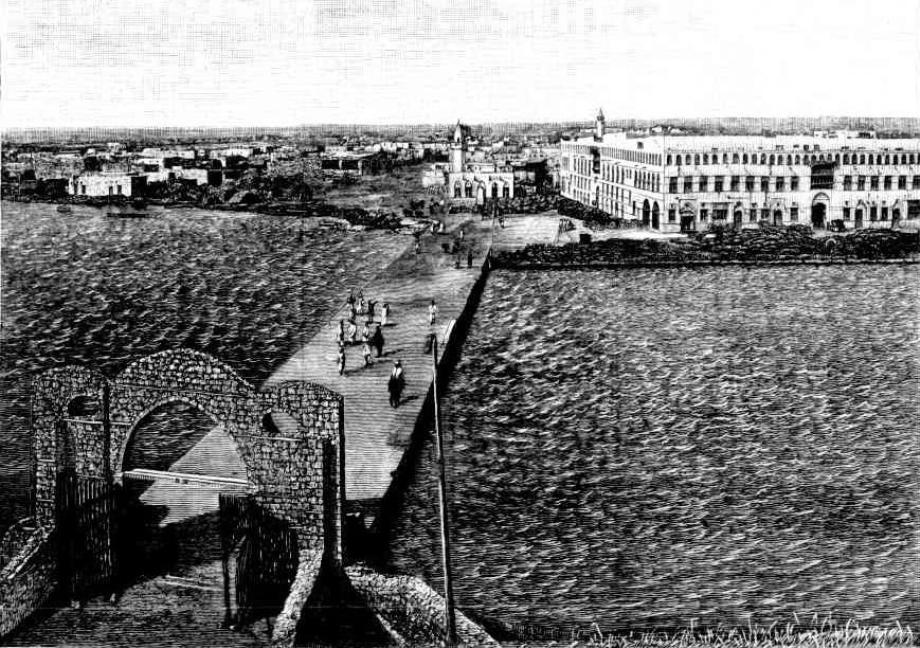
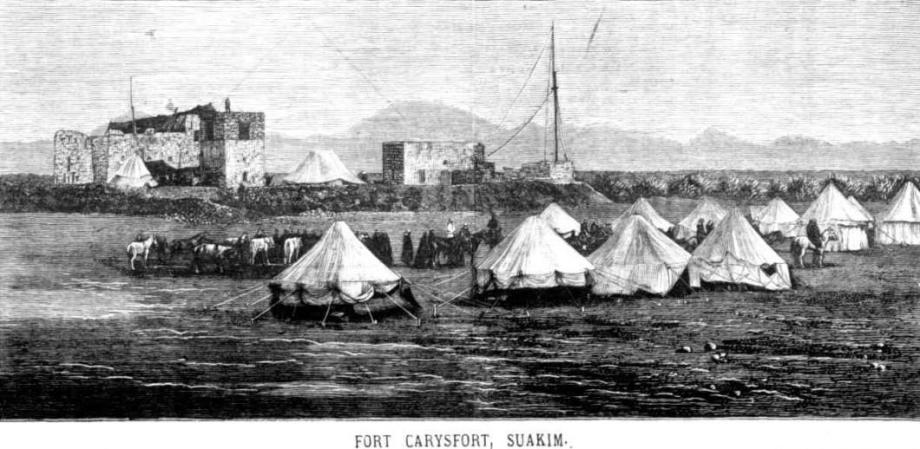
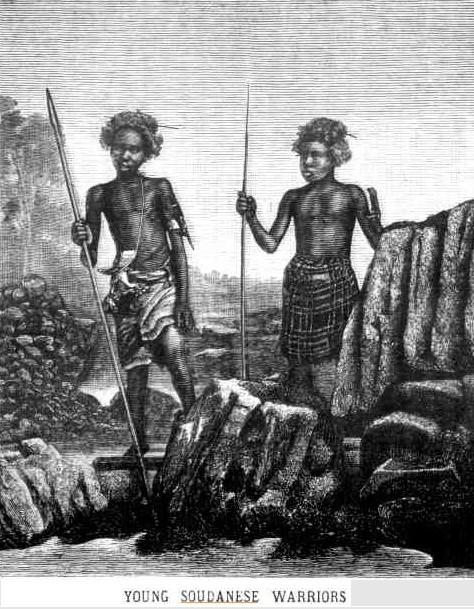
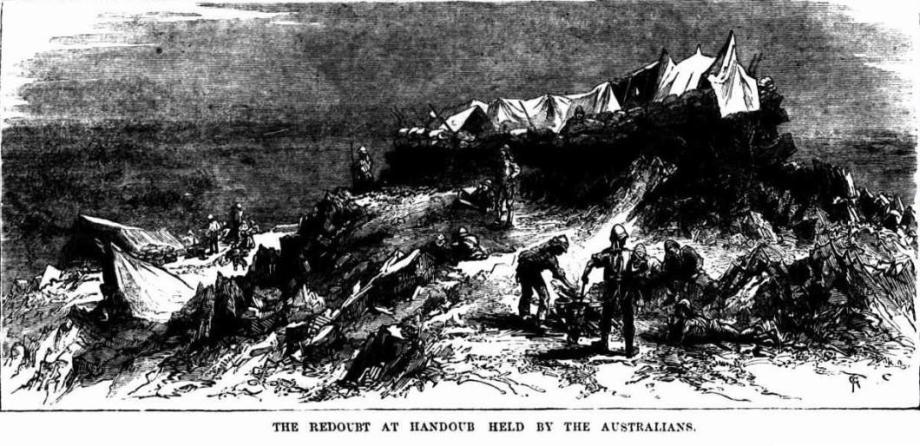
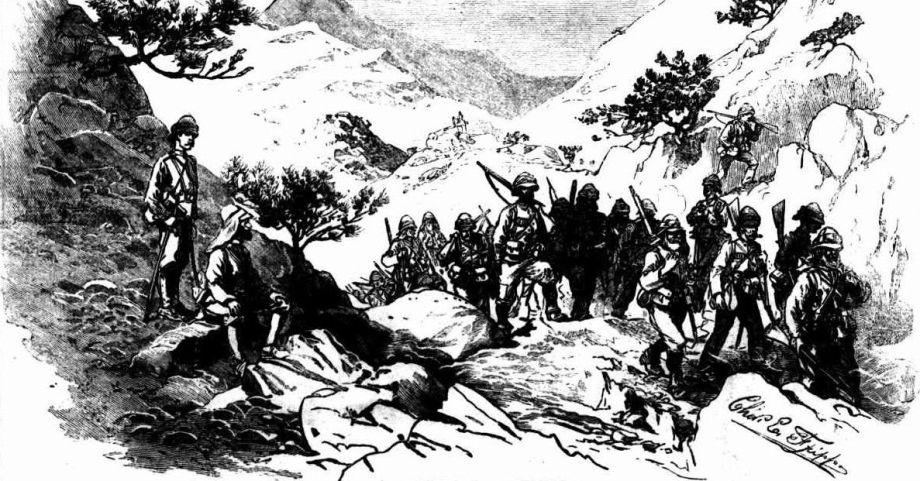
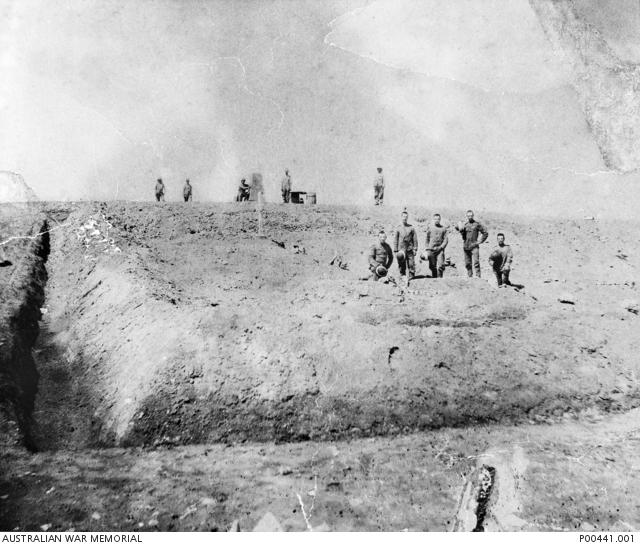
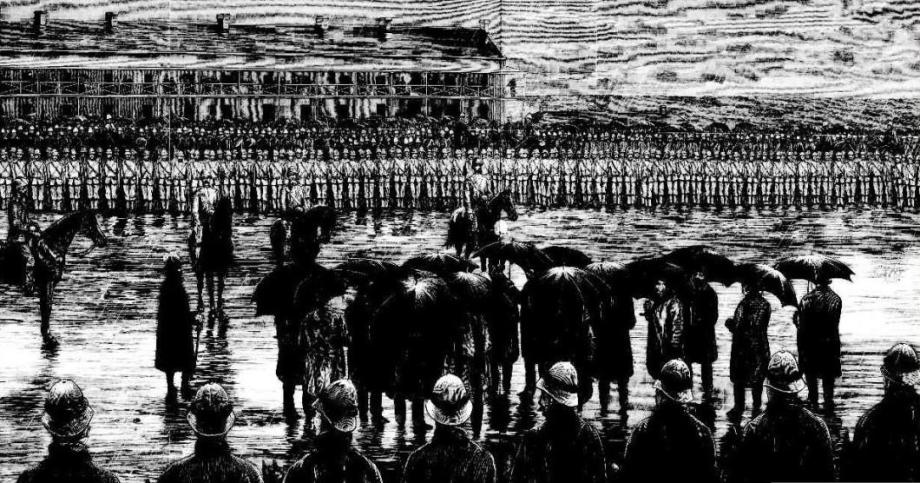
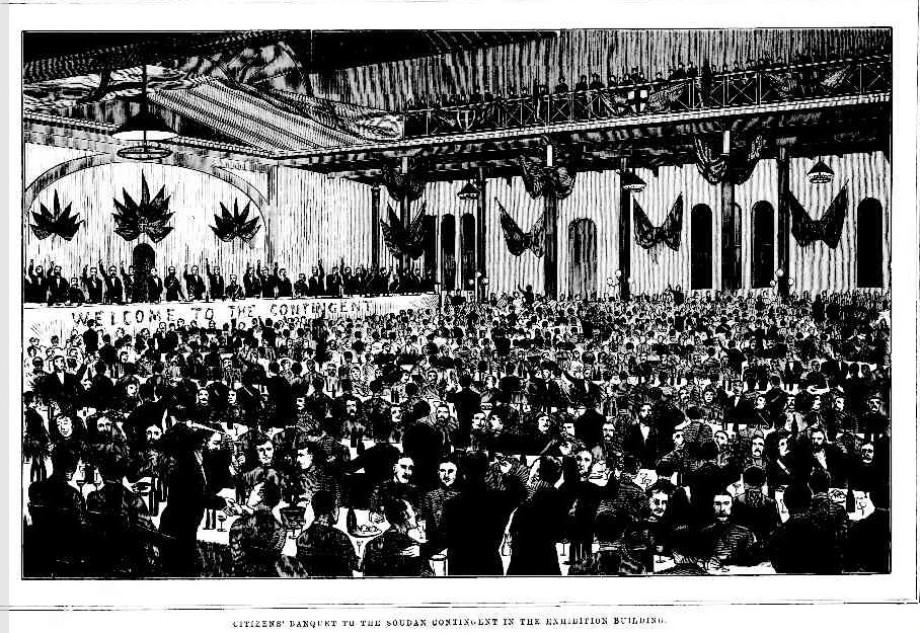
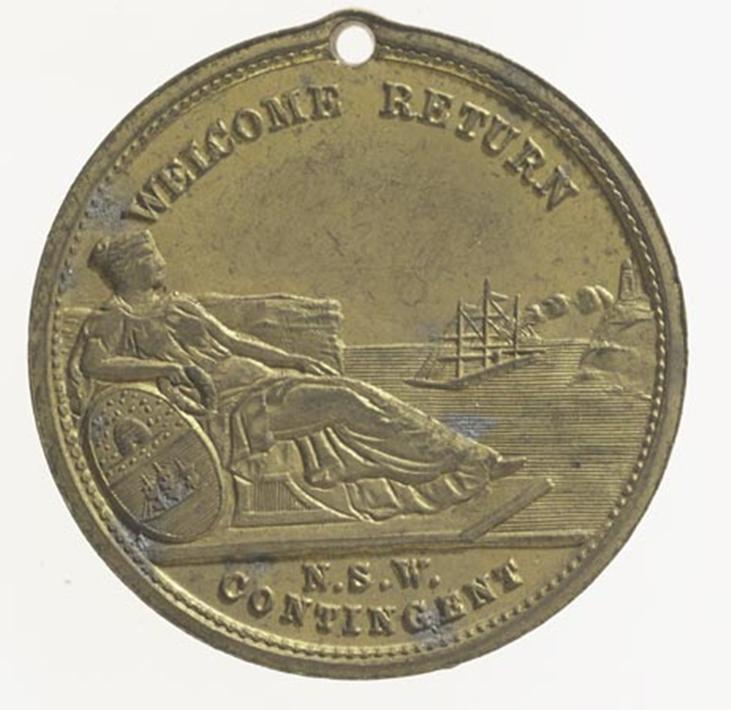
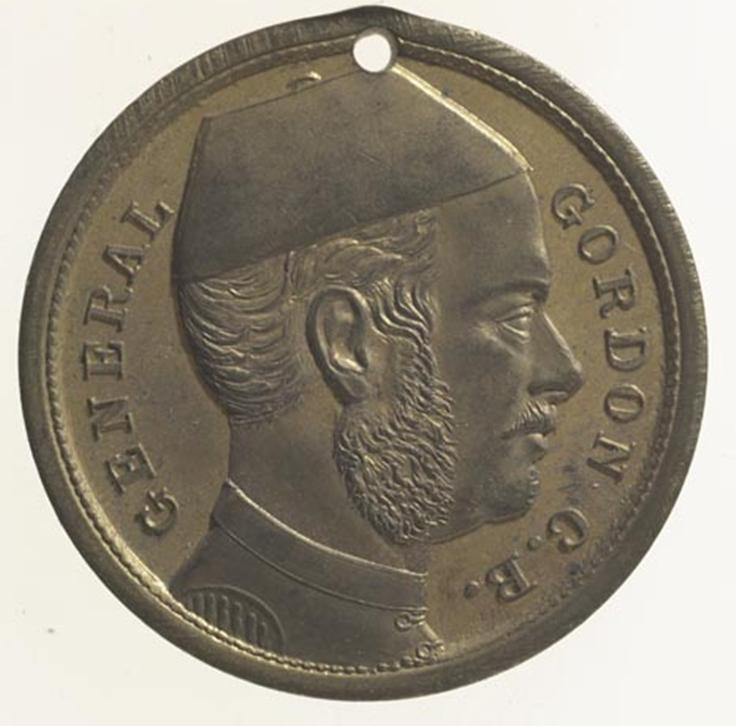
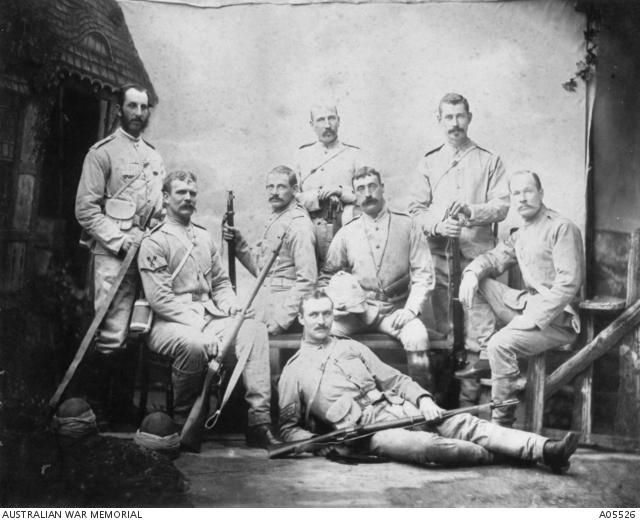
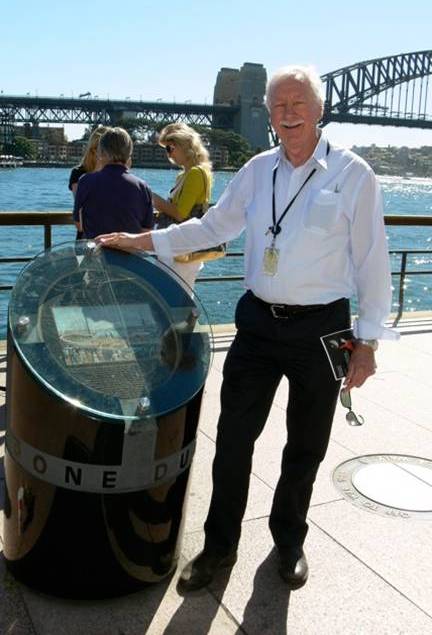
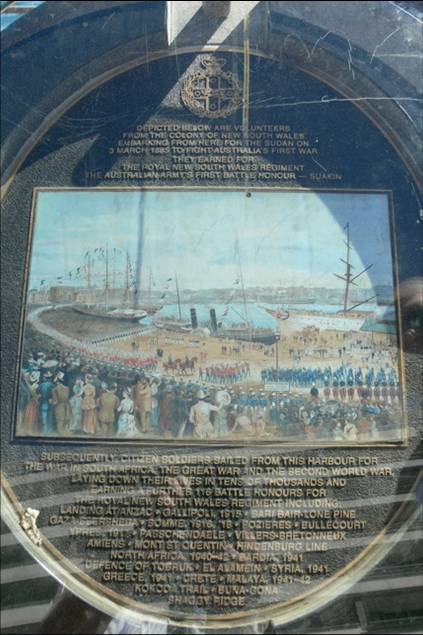

THE RETURN OF THE SOUDAN CONTINGENT. SCENE IN OXFORD STREET. THE RETURN OF THE SOUDAN CONTINGENT. (1885, July 4).Illustrated Sydney News (NSW : 1881 - 1894), p. 1 Supplement: SUPPLEMENT TO THE "ILLUSTRATED SYDNEY NEWS.". Retrieved from http://nla.gov.au/nla.news-article64036391
Extras:
OPEN BEACHES. Newport Beach, which was recently resumed by the Government, will be officially, opened on Saturday afternoon at 3 o'clock. Mrs. Nielsen, wife of the Minister for Lands, will perform the ceremony. The beach will then be placed in the control of the Warringah Shire Council. Newport is one of the famous tourist resorts in New South Wales.
The Manly Council at a recent meeting passed resolutions to approach the Government through Dr. Arthur, M.L.A., with reference to resuming Little Manly Beach and Forty Baskets Beach, lying in the vicinity of Manly Cove. At present the foreshores at these beaches are locked up, and the council is desirous of placing them in the hands of the people. OPEN BEACHES. (1911, April 6). The Sydney Morning Herald(NSW : 1842 - 1954), p. 7. Retrieved from http://nla.gov.au/nla.news-article15245574
NORTH HARBOUR FERRY. A motor service to run from the wharf near the Manly baths to a new wharf built at the south end of Forty Baskets beach, is to be Inaugurated on Saturday. This service Will open up 230 acres of reserve. NORTH HARBOUR FERRY. (1922, January 18). The Sydney Morning Herald (NSW : 1842 - 1954), p. 16. Retrieved from http://nla.gov.au/nla.news-article15985915
BIBLE FROM THE DUNBAR
By G. A. KING
'THE ship's Bible salvaged from the Dunbar, which was wrecked near Sydney Heads 97 years ago today will be used at the annual commemoration of the disaster at Camperdown Cemetery to-day.
The Bible has been in the possession of the Whealey family, of Manly, since it was picked up at what is now known as Forty Baskets Beach on the day of the wreck of the Dunbar---August 21, 1857.
The Bible has been handed to the Rector of St. Stephen's Church, Newtown, because of the association of Camperdown Cemetery, in which the Church stands, with the wreck.
Many of the victims of the Dunbar disaster are buried in the cemetery. It is likely that the Bible will be passed to the cemetery trustees for preservation with other relics of the Dunbar.
Accompanying the Bible was a statement by the Whealey family, recording the story of the recovery of the volume..
It is stated that much wreckage from the Dunbar was cast upon the Forty Baskets Beach, near the home of John and Jane Whealey. Their sons, Daniel and William, searched the wreckage. Among the debris was the Bible.
One hundred and twenty passengers and members of the crew lost their lives in the wreck.
There was only one survivor, James Johnson, a seaman. For many years after the wreck he was stationed at Nobbys (New-castle) lighthouse, and died in 1915.
THE Bible is slightly water stained, but its otherwise good condition is probably due to its having been kept in a box perhaps a watertight case similar to the tin or steel deed boxes then in general use. A few of the pages, including the title page, are missing.
The Commonwealth Secretary of the British and Foreign Bible Society, the Rev. H. M. Arrow-smith, closely examined the Bible. He found the date "1838"at the beginning of the New Testament.
Mr. Arrowsmith said the volume is one of the editions printed at the Pitt Press, Cambridge, by John William Parker, printer to the Cambridge University.
On the inside of the Bible is the name of Daniel Whealey, and the date "August 21, 1857"-the day on which the Dunbar was wrecked.
Underneath the name of Daniel Whealey is a quotation from Proverbs: "A good name is rather to be chosen than great riches, and loving favour rather than silver and gold. The rich and the poor meet together: the Lord is the maker of them all."
There is pasted in the Bible a membership certificate of the Juvenile Temperance Association of New South Wales in the name of William Whealey, dated September 19, 1869. This society was founded earlier in that year. BIBLE FROM THE DUNBAR. (1954, August 21). The Sydney Morning Herald (NSW : 1842 - 1954), p. 10. Retrieved from http://nla.gov.au/nla.news-article18423642
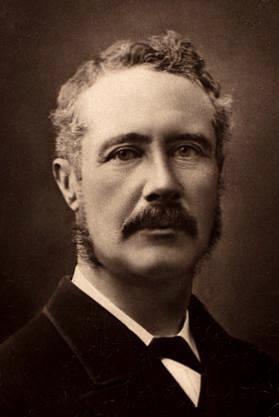 Major-General Charles George Gordon, CB (28 January 1833 – 26 January 1885), also known as Chinese Gordon, Gordon Pasha, and Gordon of Khartoum, was a British army officer and administrator.
Major-General Charles George Gordon, CB (28 January 1833 – 26 January 1885), also known as Chinese Gordon, Gordon Pasha, and Gordon of Khartoum, was a British army officer and administrator.
He saw action in the Crimean War as an officer in the British Army. For this service he was appointed a Chevalier of the Legion of Honour by the Government of France on 16 July 1856. But he made his military reputation in China, where he was placed in command of the "Ever Victorious Army," a force of Chinese soldiers led by European officers. In the early 1860s, Gordon and his men were instrumental in putting down the Taiping Rebellion, regularly defeating much larger forces. For these accomplishments, he was given the nickname "Chinese" Gordon and honours from both the Emperor of China and the British.
He entered the service of the Khedive in 1873 (with British government approval) and later became the Governor-General of the Sudan, where he did much to suppress revolts and the slave trade. Exhausted, he resigned and returned to Europe in 1880.
A serious revolt then broke out in the Sudan, led by a Muslim reformer and self-proclaimed Mahdi, Muhammad Ahmad. Gordon was sent to Khartoum with instructions to secure the evacuation of loyal soldiers and civilians, and depart with them. After evacuating about 2,500 British civilians he retained a smaller group of soldiers and non-military men. In the buildup to battle, the two leaders corresponded, each attempting to convert the other to his faith, but neither would accede. Besieged by the Mahdi's forces, Gordon organized a city-wide defence lasting almost a year that gained him the admiration of the British public, but not the government, which had not wished to become entrenched (as Gordon was instructed before setting out). Only when public pressure to act had become too great did the government reluctantly send a relief force. It arrived two days after the city had fallen and Gordon had been killed.
Image: Charles George Gordon (1833-1885); Carbon print on card, Geruzet Frères - Belgian (active c. 1870-1889) - Harvard Art Museum/Fogg Museum, Historical Photographs and Special Visual Collections Department, Fine Arts Library
Charles George Gordon. (2015, July 17). In Wikipedia, The Free Encyclopedia. Retrieved from https://en.wikipedia.org/w/index.php?title=Charles_George_Gordon&oldid=671851609
THE WAR IN THE SOUDAN.
With the view of enabling our readers to comprehend more clearly the position of affairs in the Soudan, and to follow the movements of the troops, we publish this week a sketch map, in which is indicated that part of the Soudan which has witnessed within the past week or two some stirring scenes— a British victory and a British defeat and the Ml of Khartoum.
The main body of the British soldiery, as may be recollected, went up the Nile as far as Korti, which was made the advanced headquarters of Lord Wolseley's army. Lord Wolseley and Colonel Sir H. Stewart, however, landed at Korosko, on the right bank of the Nile, about 100 miles south of Assouan, and made their way through the Nubian desert to Abu Hamad, intending to follow the Nile thence to Berber. This desert road between Korosko and Abu Hamadis about 270 miles in length. It is usually preferred by ordinary travellers, as by its means they avoid all the most difficult cataracts of the Nile and 6ave an immense circuit of river navigation.
THE BRITISH EXPEDITION.
We gather much information regarding the where-abouts and movements of the British troops from our latest files to hand, that is, to January 21, being especially indebted to the Illustrated London News : —On December 30 Brigadier- General Sir Herbert Stewart, with a portion of the advanced force, comprising the camel corps and the mounted infantry, started from Korti, on the route across the Bahuda desert to Metemneh, opposite Shendy, and about halfway between Berber and Khartoum. This route passes by the oases' of Harabok, El Koweiyat, Abou Haifa, and Gakdul, at the foot of the mountain ranges called Jebel Magarand Jebel Gilif, and farther along the line where the Egyptian Government once proposed to construct a railway to reach the Nile opposite Shendy, and there to meet General Gordon descending with his steamboats from Khartoum. The distance from Korti to Shendy is estimated at rather more than180 miles. The favourable indications of water presented by the marks of streams, ponds, and wells are not entirely to be relied upon, as they are often found dry even at this season of the year. At Gakdul, which is 90 miles from Korti, and is about midway of the entire route, there are good wells ; and Sir Herbert Stewart was to establish a military post there, for which he took with him a quantity of stores carried by camels. The mounted infantry were intended to bring back the convoy of camels from Gakdul to Korti, after they had been unloaded, and then the headquarters, the rest of the camel corps, the artillery, and the 19th Hussars were to move forward by way of Gakdul and Shendy to Khartoum. A garrison was left at Korti, which constituted the advanced base. In the meantime Lord Wolseley sent a large detachment of troops, led by General Earle, up from Korti to Merawe, which was intended first to inflict preliminary chastisement on the Monassir tribe, between the Fourth and Fifth Cataracts, for their treacherous murder of Colonel J. D. Stewart and Mr. Frank Power. After thus dealing with the Monassir tribe, General Earle was to proceed northwards to Abu Ahmad, at the top of the great bend of the river, where he would cross the Nile and reopen the direct north road across the Nubian desert to Korosko. This operation was evidently designed to prepare the line to be taken hereafter for withdrawing troops from the Soudan, and for the removal of the Khartoum Egyptian garrison. Lord Wolseley expected on the 4th January to advance from Korti with the remainder of the camel corps, the artillery, and other trocps, joining those under Sir Herbert Stewart at Gakdul. The most difficult part of the route for marching is from Gakdul to Abuklea, there being no water for a space of 45 miles, so that the camels would have to carry enough water for the horses and the men. It was known that much depended on the friendly assistance of the Kabbabish tribes who inhabit the centre and south of the Bayuda desert. The tribes of the Hassanyeh towards Metemneh have been hitherto most hostile to General Gordon. The Mahdi took up a defensive position northwest of Khartoum, haying pitched his camp near Margait, either in the plain at the foot of Jebel Fereid or on the reverse slope of that mountain.
His reasons for selecting this particular spot are obvious. From that point he could command the wells of El Goz, and to a certain extent the western route between Debbeh and Khartoum, which he doubtless supposed would first be threatened by a British advance. He could keep a watchful eye on the doubtful Hassanyeh, Sowarab, and Hau-nau-hin tribes, whose adhesion to his cause or desertion to the British depended very much on the weakness or strength of the force the British might be able to concentrate quickly about the neighbourhood of Merawe. He could, if need be, stretch out a hand to the Monassir Arabs, one of whose sheikhs was responsible for the recent massacre of Europeans and natives coming down from Khartoum. He has a firm grip of heights where the Nile runs through a narrow ravine, with precipitous cliffs on each side, and was in the best position for harassing by frequent attacks the defenders of Omderman, a stronghold to which Gordon clang tenaciously, because it covers, and in an enemy's hand dominates, the most exposed face of Khartoum. The detachment commanded by General Earl, which started up the river from Korti on Sunday, December 28, the 19th Hussars following on Monday along the bank of the river, and part of the Engineers riding on camels, altogether numbered 2400 men — namely 900 infantry, including the South Staffordshire regiment and 1500 of the Mounted Brigade, with six screw guns. The means of transport were as under : — Camels, 1800 ;horses, 400 ; steamers, 2 ; pinnaces, 2 ; and whalers, 64. The 19th Hussars were to act as scouts to the expedition. A camp was to be formed at Han dab, near the Fourth Cataract, 35 miles above Merawe and 100 miles from Korti. The river movements were directed by Colonel Brackenbury, in the pinnace of H.M.S. Monarch. The South Staffordshire regiment, nearly 600 strong, was towed in 52 whaleboats. A large quantity of entrenching tools were taken, to be used in fortifying defensive positions. It was expected that the whole of Lord Wolseley's force would be collected at Korti by the middle of January. Sir Herbert Stewart's advanced force from Korti consisted of 1150 men, of whom the guards and marines numbered 381, the mounted infantry 31, the heavy dragoons 90 men, with 259 camels ; the light cavalry 90 men, with 250 camels; the Royal Engineers 29 men, with 40 camels; the artillery, without guns, 20 men, with 16 camels ; the commissariat 20 men and 200 natives, with 500 camels ; the 19th Hussars 45 men and horses ; the medical staff, four officers, 45 men and 35 natives, with 90 camels, including a section of movable hospital tents, a section of bearers, and a company of litters, with 750 gallons of water. There were nearly 2000 camels altogether. Every man carried seven gallons of water, seven days' {rations, 150 rounds of ammunition, the reserve being 40,000 rounds. The guards and marines were to remain at Gakdul, the other troops were to return at once, bringing back the guards' camels. Sir Herbert Stewart, it was expected, would reach Gakdul in three days.
RECENT MOVEMENTS.
And now for events and movements subsequent to the 3rd ultimo we must trust to our own cable graphic information. Sir Herbert Stewart, with the infantry and cavalry, reached Gakdul unopposed on January 2, and the successful march created a complete surprise. He returned to Korti, leaving the Guards in charge of the wells, where they fortified their position. Three days later the rebels were reported to be watching in the distance, and to be entrenched 3000 strong at Metemneh. Sir Herbert Stewart evidently arrived at Korti safely, for on the 9th January we learnt that he had again left for Gakdul with the Hussar contingent, the camelry, the Sussex regiment, and Naval Brigade. The whole force arrived at Gakdul safely. About a week later we were informed by cable that the chiefs of the Kabbabish tribe had given their allegiance to Lord Wolseley, and that a sharp fight had taken place between the rebels and the forces under General Gordon, at Omderman, which is situated on the Nile almost immediately opposite Khartoum, when the rebels sank one of General Gordon's steamers. On the 14th January Sir Herbert Stewart left Gakdul for Metemneh. It was also stated in the same message that the Naval Brigade, which comprised a portion of Colonel Stewart's men, had pushed onwards and met with General Gordon's steamers, in which they were proceeding to Khartoum. In a telegram dated London, January 1G, it was stated that Colonel Sir Herbert Stewart, with the force under his command, had reached Hawaya, some distance below Shendy, on the Nile, unopposed by the rebel forces. Then on the 21st General Lord Wolseley sent a telegram to the Horse Guards reporting that the cavalry had arrived at Hamdab, and made a lengthy reconnaissance towards Berber, without having met with opposition on the part of the Mahdi's adherents.
BRITISH VICTORY.
Then came news of the attack by the rebels whom Sir Herbert Stewart's force encountered on its march
SKETCH MAP OF THE SOUDAN.
to Metemneh. Our readers are familiar with the details, but we republish in effect the telegram sent by General Lord Wolseley to the Horse Guards. It was as follows : ' The engagement took place on Saturday last, 17th January, between the troops acting immediately under the orders of Colonel Herbert Stewart and a rebel force estimated variously at from 10,000 to14, COO men, who had taken up a position at and around Abecklea Wells. The British commander, on ascertaining the presence of the enemy on his front, left the camels and baggage train in the rear, and advancing with his whole force in square, all being on foot, succeeded in outflanking the Mahdites, who made a splendid charge, which was responded to by a withering fire from the British. Notwithstanding this, the Arabs succeeded in penetrating the left side of the square. The British troops, however, remained admirably steady, and maintained a hand-to-hand encounter with the enemy, who lost heavily at this point. The other parts of the square meantime kept up a deadly fire, and finally the enemy gave way, and were successfully repulsed, leaving 800 dead on the field, besides a urge number of wounded. Shortly after the Hussar regiment occupied Abecklea Wells. Sir Herbert Stewart is now advancing on Metemneh. The British loss is stated by Lord Wolseley as nine officers killed, including Lieutenant-Colonel Fred Burnaby, of Khiva renown ; nine officers wounded, including Viscount St. Vincent, captain 16th Queen's Lancers, and Earl of Airlie, captain 10th Hussars. Sixty-five men were killed, 85 wounded.' A subsequent telegram stated that Colonel Stewart had a narrow escape, his horse being killed under him.
ANOTHER BRITISH VICTORY.
On the 19th January Sir Herbert Stewart arrived within four miles of the Nile. The enemy showed front in great force. The British commander halted and constructed a zariba under a heavy fire which the Arabs opened upon him. At this time Sir Herbert Stewart was severely wounded and was placed horsed combat. Colonel Sir Charles Wilson, R.E., then assumed command. Leaving the wounded behind him at the zariba, he marched out the same afternoon to attack the Mahdites ; the latter were led by several Emirs on horseback. They made a desperate charge on the British line, but were repulsed, with the loss of five Emirs and 250 men killed. The wounded were also very numerous. The casualties on the British side were not stated. Mr. Cameron, the well-known correspondent of the Standard, and Mr. Herbert, the representative of the Morning Post, were both killed. On the 24th ultimo we were advised by cable that the column under the command of Major-General W. Earle had started from Hamdab for Berber by way of Abu Hamad. It was thought probable that Major General Earle would encounter some opposition in his advance, as the enemy were known to have collected a force a distance of about 35 miles beyond Hamdab.
OPERATIONS AT METEMNEH.
It was reported that Metemneh had been captured by the British, but the report proved to be unfounded. On arrival before that place a close inspection was made by Sir Charles 'Wilson, which showed it was well fortified and held by a rebel force of at least 2000 strong. Sir Charles Wilson, therefore, considered it not worth while to incur heavy loss by assaulting it. At the time of the inspection and shortly afterwards news was received that five steamers, under Misre Bey, one of General Gordon's officers, had arrived at Khartoum from Gabat, a place a short distance to the south of Metemneh, and had landed guns and men. Upon learning this Sir Charles Wilson immediately pushed onto Gabat. whence he started in two steamers to Kartoum with a detachment of the Royal Sussex regiment on the 24th ultimo. Metemneh was attacked on the 21st ultimo. The British lost nine men and then withdrew. Colonel Sir Charles Wilson afterwards bombarded Shendy. Viscount St. Vincent was killed, and the Earl of Airlie and Lord Somerset were seriously wounded. It is reported that there is an abundance of forage at Gabat. The enemy was never nearer the British forces than 30 yards. It is estimated that 7000 men were engaged on the side of the enemy, of whom it is calculated 1300 perished. The British losses were20 killed and 60 wounded. The arrival at Gabat of Miere Bey, one of General Gordon's officers, with guns and ammunition, was arranged by message between Lord Wolseley and General Gordon.
ARAB DEFEATS.
On the 30th ultimo the cavalry under the command of Major-General Earle were attacked by a large body of Arabs while on his way to Berber, about seven miles from Birti, a stronghold to which the Arabs retreated after their late defeat. Severe fighting ensued, in which the enemy were repulsed with heavy loss. Major-General Earle followed up his advantage, and attacked the Arabs in turn, who retreated to Berti. The Arabs subsequently abandoned Berti, and Major-General Earle occupied the place. The greatest difficulty was experienced in the ascent of the Nile from Korti, owing to the lowness of the water and shitting sandbanks, but the column, it was reported, was overcoming all obstacles, and the remainder of the journey was expected to be accomplished with comparative ease. Intelligence was received from Suakim stating that a force of 80 men, consisting of Hussars and Egyptian cavalry, recently made an attack on the village of Handoub, in the vicinity of Suakim, occupied by hostile Arabs. They burned it to the ground, but on returning to Suakim were completely surrounded by the rebel tribes, and had to cut their way through ,escaping to Suakim with the loss of eight Hussars and three Egyptians, besides which a number were wounded.
DISASTROUS NEWS.
During the present week we have received intelligence of the most adverse kind— a British defeat, the fall of Khartoum, and the capture, if not death, of General Gordon. We must refer our readers to our cablegrams for particulars of these events, which have electrified the British public and aroused their indignation.
GENERAL GORDON.
Our readers will recollect the Egyptian campaign of 1882, when Arabi was defeated. There was then some prospect of placing Egyptian affairs on a more satisfactory footing ; but news of serious disasters in the Soudan reached Cairo, and the contemplated withdrawal of British troops was indefinitely postponed. The Egyptian Government (we now quote from a small work by Mr. G. R. Emerson) persisted in its endeavours to subdue the Soudan, and sent a military force commanded by a British officer, Colonel Hicks, who had seen much service in India. That force was annihilated. A new state of things had developed, and the Soudan leaders threatened to invade Egypt itself. Mahomedans had long entertained the idea that about this time a new prophet and leader would appear as the champion of Islam and the hero of new victories over Christian nations, and this prophet was discovered in the person of the Mahdi, Mahomet Achmet. An enormous force had been collected, irregular indeed in discipline, but composed of warriors of the most desperate courage. The military leader was Osman Digna, a man of no ordinary vigour. The English nation, which is exercising a virtual protectorate over Egypt, felt that British troops must undertake the task Egyptians were incompetent to perform but it was determined, if possible, to avoid farther fighting, and to endeavour to arrange the difficulty by peaceful means, fielding to British representations, Egypt agreed to abandon all attempts to subdue the Soudan ; but there were advanced garrisons at Sincat, Tokar, and other places which must be relieved. All eyes were turned to Gordon as the man of the situation. He was in Belgium, but, summoned home, he immediately returned, and in 24 hours was on his way to Egypt, accompanied by Lieutenant- Colonel Stewart, who was well acquainted with the country. General Gordon and Colonel Stewart wrote memoranda, giving their opinions upon the question of the evacuation of the Soudan, on board the Tanjore at sea on January 22nd. General Gordon says : —
'I understand that her Majesty's Government have come to the irrevocable decision not to incur the very onerous duty of securing to the peoples of the Soudan a just future Government. That, as a consequence, her Majesty's Government have determined to restore to these peoples their independence, and will no longer suffer the Egyptian Government to interfere with their affairs. For this purpose her Majesty's Government have decided to send me to the Soudan to arrange for the evacuation of these countries and the safe removal of the Egyptian employees and troops? My idea is that the restoration of the country should be made to the different petty sultans who existed at the time of Mehemet's Ali's conquest, and whose families still exist; that the Mahdi should be left altogether out of the calculation as regards the handing over the country; and that it should be optional with the sultans to accept his supremacy or not. As these sultans would probably not be likely to gain by accepting the Mahdi as their sovereign, it is probable that they will hold to their independent positions. Thus we should have two factors to deal with — namely, the petty sultans asserting their several independence and the Mahdi's party aiming at supremacy over them. To hand, therefore, over to the Mahdi the arsenals, &c., would, I consider, be a mistake. They should be handed over to the sultans of the States in which they are placed. The most difficult question is how and to whom to hand over the arsenals at Khartoum, Don'gola, and Kassala, which towns have, so to say, no old standing families, Khartoum and Kassala having sprung up since Mehemet Ali's conquest. Probably it would be advisable to postpone any decision as to these towns till such time as the inhabitants have made known their opinion.
Gordon's instructions.' The following are the instructions sent by Lord Granville to General Gordon : —
' Foreign Office, January 18, 1884.' Sir, — Her Majesty's Government are desirous that you should proceed at once to Egypt, to report to them on the military situation in the Soudan, and on the measures which it may be advisable to take for the security of the Egyptian garrisons still holding positions in that country, and for the safety of the European population in Khartoum. You are also desired to consider and report upon the best mode of effecting the evacuation of the interior of the Soudan, and upon the manner in which the safety and the good administration by the Egyptian Government of the ports on the seacoast can best be secured. In connection with this subject, you should pay especial consideration to the question of the steps that may usefully be taken to counteract the stimulus which it is feared may possibly be given to the slave trade by the present insurrectionary movement, and by the withdrawal of the Egyptian authority from the interior. You will be under the instructions of her {[Majesty's Agent and Consul-General at Cairo, through whom your reports to her Majesty's Government should be sent under flying _seal. You will consider yourself authorised and instructed to perform such other duties as the Egyptian Government may desire to entrust to you, and as may be communicated to you by Sir E. Baring. You will be accompanied by Colonel Stewart, who will assist you in the duties thus confided to you. On your arrival in Egypt you will at once communicate with Sir E. Baring, who will arrange to meet you, and will settle with you whether you should proceed direct to Suakim, or should go yourself, or despatch Colonel Stewart to Khartoum via the Nile.— I am, &c., (Signed)Granville.''
With only one or two attendants, Gordon and Stewart once at made their way to Khartoum, and into deserts forming the entrance to the Soudan country. Having communicated with some of the chiefs, with apparently satisfactory results so far as promises of friendship were concerned, Gordon set seriously to work to endeavour to carry out the instructions he had received. In a very few days after his arrival he issued a proclamation, which greatly startled the public at home, and which Ministers were seriously embarrassed to explain. It appeared to be a sanction of slavery, and coming from Gordon, supposed to be the most energetic of opponents to the slave trade, really had an extraordinary appearance.
The proclamation was as follows : —' To all the inhabitants :— As I have been appointed Governor of all the Soudan, with the approval and by the decree of the Exalted Khedive and Britannia, the All-Powerful, the Soudan and its Government have become independent, and will look after their own affairs, without interference by the Egyptian Government in anything whatever. I also proclaim an amnesty, and grant you the privileges given during the reign of Said Pasha ; and inform you that his Majesty the Sultan, the Exalted, had made up his mind to send Turkish soldiers, the well-known valiant and courageous conquerors. But when his Majesty heard of your wretched condition, and of my compassion for you, he sent me, at great risk, putting my faith in the God of all mankind, to prevent the declaration by his Majesty the Sultan of war between Moslems. Your tranquility is the object of our hope. And I know that you are sorrowful on account of the slavery which existed among you, and the stringent orders on the part of the Government for the abolition of it, and the punishment of those who deal in them (the slaves), and the assurances given by the Government for its abolition, seizing upon and punishing those concerned in the trade ; the punishment of those who trade in slaves, according to imperial decrees, and the firmans forwarded to you— all this is known to you. But henceforward nobody will interfere with you in the matter, but everyone for himself may take a man into his service henceforth. No one will interfere with him, and he can do as he pleases in the matter, without interference on the part of anybody ; and we have accordingly given order. My compassion for you. (Signed) Gordon Pasha.''
In reply to urgent inquires on the subject, Gordon wrote:— In answer you thus : Her Majesty's Government, with the full consent of the Khedive, has decided to separate the Soudan from Egypt; and both Governments have sent me to carry out the evacuation of the Soudan and to restore native government. I ask you what your answer would have been to the people of the Soudan when they asked me whether her Majesty's Government was to hold by the treaty, which I have read, that the slaves can be liberated in 1889? I answered that the treaty would not hold good, so far as I was concerned; and that I should not interfere with slave-holding. As to the exact words of the proclamation, when translated from the Arabic, I cannot speak, for I dictated merely the sense of it. This I shall have to say; and I would ask you if, taking your view of the dangers of a retirement to Cairo into account, and the peril to Khartoum, &c., I was not justified in telling the people what was self evident to them-— namely, that the separation of the Soudan from Egypt abrogated all the treaties made between Cairo and foreign Governments ? I would add that I have ever considered the liberation of the slaves, without compensation, or without some gradual registration system, as robbery; and I am supported in this view by the action of Parliament in 1833, when it granted £20,000,000 to liberate the West Indian slaves. Further, I say you will never carry out the treaty of 1877 in Egypt,' by which the slaves are to be liberated in 1884. Had I said that I would allow slave-hunting, then you might have complained. What I stated was in re slave-holding. As for slave-hunting, rest assured that I have not forgotton it; and, God willing, I will take such measures as will prevent it- I wonder if you are aware of the fact that when I was Governor-General here I never interfered with slaveholding ; and that, in fact, till 1889, no one could do so even under the old regime. All my work was against slave-hunting. So much did I regard the existing slaves as property that I have often bought individuals myself and given them their liberty.'
Gladstone's opinion of Gordon.
In the course of the great debate on the proposed vote of censure on the 12th of February, Mr. Gladstone said : —' Who is General Gordon? He is no common man. And I may also say that General Gordon is not alone a very able man is with him, one in particular, Colonel Stewart, who is his seconder and coadjutor. We have all along obtained for this difficult Egyptian problem the best men we could possibly obtain. It is no exaggeration in speaking of General Gordon to say that he is a hero ; it is no exaggeration to say that he is a Christian, and that in his dealings with Oriental peoples he has a genius — that he has a faculty of influence and command brought about by moral means ; for no man in this House hates the unnecessary resort to blood more than General Gordon. He has that faculty which produces effects among those wild Eastern races almost unintelligible to us Westerns. . „ .
At Cairo General Gordon formed a plan ; we received it in the shape of a very valuable memorandum. We have had doubts whether it was our duty to produce it. If we could produce it merely to this House, or even to this country alone, we would do so, but we must have regard to its promulgation in Egypt by telegrams sent from here to Egypt I would rather not enter into particulars ; but I will say this, that it was evidently a well reasoned and considered plan, and that it was entirely pacific in its basis ; that it proceeded on the basis which would have been fanatical and presumptuous in my case, or in that of any member of this House, but which was not fanatical or presumptuous in the case of a man with the gifts and powers of General Gordon. He intended to exercise a pacific influence by going to the right persons in the Soudan. It was his desire as much as ours that this should be done without any resort to violent means. General Gordon went, not for the purpose of reconquering the Soudan, or to persuade the chiefs of the Soudan — the sultans at the head of their troops — to submit themselves to the Egyptian Government.
He went for no such purpose as that. He went for the double purpose of evacuating the country, by extricating the Egyptian garrisons, and reconstituting it, by giving back to those sultans their ancestral powers, withdrawn or suspended during the period of Egyptian occupation. I have told the House already that General Gordon had in view the withdrawal from the country of no less than 29,000 persons under military service in Egypt, and the House will see how vast was the trust which was placed in the hands of this remarkable person. We cannot exaggerate the importance we attach to his mission. We are unwilling —I may say we were resolved to do nothing which should interfere with the pacific scheme, a scheme, be it remembered, absolutely the only scheme, which promised a satisfactory solution of the Soudanese difficulty by at once extricating the garrisons and reconstituting the country upon its old basis of local privileges.' '
GORDON AT KHARTOUM.
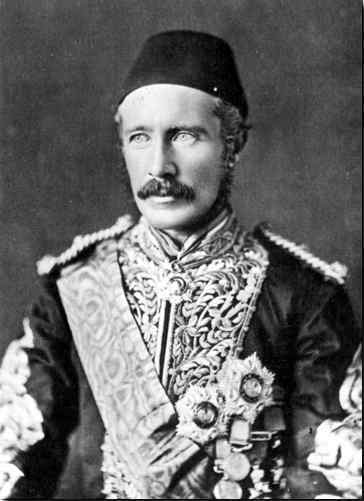 Gordon reached Khartoum on the 18th February last, having found Shendy and Berber at peace, and the entire line from Cairo free and open. But the desperate fighting about Suakin had taken place, the Mahdi's agents were active everywhere, and Gordon at once realised that to attempt to retire would be to set the country in a blaze.
Gordon reached Khartoum on the 18th February last, having found Shendy and Berber at peace, and the entire line from Cairo free and open. But the desperate fighting about Suakin had taken place, the Mahdi's agents were active everywhere, and Gordon at once realised that to attempt to retire would be to set the country in a blaze.
Right: General Gordon in Egyptian uniform
He made three proposals to the Government — 1st, that he should visit the Mahdi, and come to a personal arrangement with him; 2nd, that Zebehr should be sent up to govern the Soudan as a native ruler, but subsidised by Egypt, and under stringent anti-slavery conditions ; and, third, that a small body of English troops 'should be sent to Wady Haifa — the Egyptian boundary line —and that the Suakin-Berber line should be opened up. The visit to Kordofan was absolutely forbidden, and Gordon was therefore left to do the best he could. Little heed was paid to his suggestions. Towards the end of March the Mahdi had a large force besieging Khartoum. Communication by telegraph was cut off, and only now and then did a cypher message reach Cairo. Shendy and Berber were captured by the rebels, and man, woman, and child massacred.
On April 8 General Gordon telegraphed Sir E. Baring : — ' I do not see the fun of being caught here to walk about the streets for years as a dervish with sandalled feet; not that (D. V.) I will ever be taken alive. It would be the climax of meanness, after I had borrowed money from the people here, and called on them to sell their grain at a low price, &c., to go and abandon them without using every effort to relieve them, whether those efforts are diplomatically correct or not ; and I feel sure, whatever you may feel diplomatically, I have your support — and that of every man professing himself a gentleman — in private.' Eight days later came this telegram : — ' As far as I can understand, the situation is this: You state your intention of not sending any relief up here or to Berber, and you refuse me Zebehr. I consider myself free to act according to circumstances. I shall hold on here as long as I can, and if I can suppress the rebellion I shall do so. If I cannot, I shall retire to the equator, and leave you the indelible disgrace of abandoning the garrisons of Senaar, Kassala, Berber, and Dongola, with the certainty that you will eventually be forced to smash up the Mahdi under great difficulties if you would retain peace in Egypt.'
In reply to a request for troops, Lord Granville sent the following despatch to Sir Evelyn Baring, dated April 23 : — ' Gordon should be at once informed, in cypher . . . that we do not propose to supply him with Turkish or other force. . . . Add expressions both of respect and gratitude for his gallant and self-sacrificing conduct and for the good he has achieved.'
This aroused public feeling in England, and the British Government were at last induced to alter their resolve. They determined to send a force for the relief of Khartoum under the command of Lord Wolseley, who adopted the Nile route in preference to one from Suakin to Berber. Gordon continued to hold his position at Khartoum and to continually harass and defeat the besiegers. Ten days ago there appeared to be no doubt whatever that Lord Wolseley's expedition would reach Khartoum safely. But, as will be seen by our cablegrams, when the relief expedition was within about 48 hours of the stronghold it fell into the hands of the Mahdi. The Nile route presented greater obstacles than appear to have been anticipated, and there was great delay in the first movements of the relieving force.
Gordon's last despatch.
In the last published despatch received by the English Government from Khartoum, Gordon wrote :' The only reinforcements the Soudan has received since the 27th of November, 1883, the date when Hicks s defeat was known in Cairo, is seven persons, including myself, and we have sent down over 600 soldiers and 2000 people. The people here and Arabs laugh over it. I shall not leave Khartoum until I can put some one in. If the Europeans like to go to the equator I will give them steamers, but I will not leave these people after all they have gone through. I fear it is too late. We must fight it out with our own means. If blessed by God we shall succeed; if not his will, so be it. Where is Wood? Kind regards to him and Generals Stephenson and Graham. You say your feeling is to abandon Soudan. So be it but before you do that you must take down Egyptian population, and this the Arabs do not see. According to all accounts 5000 were murdered at Berber. All is for the best. I will conclude in saying we will defend ourselves to the last ; that I will not leave Khartoum; that I will try and persuade all Europeans to escape ; and that I am still sanguine that by some means not clear God will give us an issue.'
POSTSCRIPT.
After the above was in type we received the sad intelligence that Gordon was assassinated. He was killed when leaving his house, and Khartoum was betrayed to the Mahdi's forces. Our telegrams elsewhere give the particulars of this most sorrowful business. THE WAR IN THE SOUDAN. (1885, February 14). The Sydney Mail and New South Wales Advertiser (NSW : 1871 - 1912), p. 324. Retrieved from http://nla.gov.au/nla.news-article163273214
CHINESE GORDON.
(From the Melbourne Argus.)
UNTIL the last two or three years very little has been known by the English people of the personality of one of the most remarkable Englishmen of the age. It was of course known by every newspaper reader that the great Taiping rebellion, which plunged great districts of China into a state of anarchy and the cruellest misery, and for a time threatened the dissolution of that vast empire, was crushed out by the military prowess of a young English engineer officer named Gordon. It was also a matter of familiar knowledge that several years afterwards, Gordon having in the meantime been relegated to comparative obscurity in some civil employment which could have been done equally well by any commonplace official, lie was sought out by the late Khedive of Egypt and appointed to an important rule in the Sodan, where again he performed work the most matter-of-fact account of which reads like a wild romance. But of the man himself we all knew little or nothing. About a couple of years ago we were helped to an insight into his very striking character by the publication, by 1)r.G. Birkbeck Hill, of the letters written by Gordon during his administration of the government of Upper Egypt and his Governor-Generalship of the Soudan. By those letters, written in the intervals of his toilsome and hopeless task, while labouring to give order and prosperity to a desolated country, struggling against the cold double dealing of his government and the treachery by which he was on all sides surrounded, or plunging into the desert with a small and doubtful force to rout out some nest of ferocious slave-dealers, we obtained for the first time a familiar insight to the simplicity of his character, the absolute fearlessness he derived from his fatalist creed, his profoundly religious nature, and the iron resolution and unfaltering courage by which his almost feminine gentleness and kindliness of disposition are balanced. Now, when a strange combination of circumstances has made the repulsive region he know as a stronghold of slave-hunters the source of a great destructive movement of religious fanaticism, and when " Chinese "-and we may add "Soudan "-Gordon is deputed as the man best fitted to deal with the country, and if possible to restore order and regular government, the biography just published by Mr. Hake comes at a very appropriate time. It is not a good biography by any means. It is defaced by a good deal of sensational, highly-coloured, and " fine" writing, of a kind very foreign to the simple nature of the man whose life it narrates. It omits a great deal in the way of personal characterisation which we should very much like to get; but as an account of the strangely adventurous career of a man who has done great things, and for whom possibly more great things are reserved, it is very acceptable for want of a better one.
We are told very little of Gordon's early life. One anecdote is indeed given of his cadetship at the Royal Military Academy, Woolwich, where it is related that he was once rebuked for incompetence, and told that he would never make an officer," whereupon he tore the epaulets from his shoulders and flung them at his superior’s feet." The prediction was an unlucky one, for from the beginning of his service as an officer of engineers he was distinguished by a zealous attention to duty and a most competent performance of every task entrusted to him. Colonel C. C. Chesnoy, in writing on Gordon's after-career in China, gave the following testimony to the manner in which the young lieutenant of engineers distinguished himself during the " black winter-" of the Crimea :-
" In his humble position as an engineer subaltern he attracted the notice of his superiors, not merely by his energy and activity, but by a special aptitude for war, developing itself amid the trench-work before Sobastopol in a personal knowledge of the enemy's movements such as no other officer attained. We used to send to him to find out what new move the Russians were making." A few years later found him in China, where he was present at the looting of the Summer Palace of Pekin. In 1802 lie was appointed to take some measures for the protection of the city of Shanghai against the Taiping rebels, by whom it was threatened. In a letter which he wrote at this time describing the ruthless devastation and misery occasioned by the rebels, lie observed-" It is most sad this state of affairs, and our government really ought to put the rebellion down." he was then actually engaged in acquiring by his military survey of that part of the country the intimate acquaintance with its topography which fitted him for the work of putting down the rebellion a short time afterwards. The fears of the wealthy merchants of Shanughai led them to subscribe for the maintenance of a force to keep the rebels back from the town, and a contingent was raised by two Americans named Ward and Burgevine. Ward however was soon killed, and Burgovine was cashiered for corrupt practices. In this position the British government was formally requested to appoint all officer to the command of the force. This it seems from Mr. Hake’s narrative, if he is correct, even at this time bore the name of the "Ever Victorious Army," a name which may have been originally given in ridicule, but which Gordon’s future success converted into a perfectly just description.
In reply to the request of the Chinese authorities General Staveley selected Gordon for the vacant post, and never was a selection more thoroughly justified. Gordon before accepting it asked that he might be allowed to finish his military survey of the district, and Captain Holland of the marines was appointed to the temporary command. Eager to distinguish himself he led the army to the assault of the walled city of Taitsan, and experienced a disastrous repulse. On this Gordon at once left his unfinished survey and took command of the army. He immediately adopted a new method of warfare, neither limiting himself to the maintenance of an ignoble attitude of defence of Shanghai nor engaging in attacks on strongholds held in force, but rapidly changing his ground, and striking blows at points where he was least expected, by which tactics he forced the rebels to keep up a position of defence at all points, and occupied them so far as to leave them neither time nor courage for raiding on Shanghai. From the first the vigour and promptitude of his operations impressed his men with a confidence they had never before possessed, and in a corresponding degree toned down the boldness of the enemy. He secured regular pay to his men, who numbered from 3t?tl0) to 1(11i)i, and put them in a regular uniform. The officers were all foreigners of different nationalities, greatly addicted to quarrelling among themselves; the privates were all Chinese. Gordon's purpose in putting them into uniform was to make the rebels believe that they had foreign soldiers to fight. It would be to no purpose to attempt even the slightest outline of the brilliant military operations of Gordon. In his generalship he showed the quality of patiently and cautiously working out a plan by which Wellington was distinguished, coupled also by that general's power of sudden dash and desperate attack, as exhibited by that general at Badajoc and Ciudad liodrigo, and by Gordon in the assault on Taitsan. His prohibition of plunder was resented by some of the men who had been demoralised by the habits of their former commanders, and on one occasion a serious mutiny broke out among the artillery, who threatened to blow the officers to pieces. The intimation of the mutiny was convoyed to the young commander, of whose dealing with it we are told:
Convinced that the non-commissioned officers were at the bottom of the affair, he called them up and asked who wrote the proclamation, and why the men would not fall in ? They had not the courage to tell the truth, and professed ignorance on both points. With great determination Gordon then told them that one in every five would be shot, an announcement which they received with groans. During this manifestation the commander, with great shrewdness, determined in his own mind that the man whose groans were the most emphatic and prolonged was the ringleader. This man was a corporal. Gordon approached him, dragged him out of the rank with his own hand, and ordered two of the infantry standing by to shoot him on the spot. The order was instantly obeyed. Gordon then sent the remaining non-commissioned officers into confinement for one hour, with the assurance that within that time, if the men did not fall in and if the name of the writer of the proclamation was not given up, every fifth man among them would be shot, This brought them to their senses. The files fell in ; the writer's name was disclosed. Gordon had done justice to him some hours before. It was the loud-voiced corporal. He had difficulties of other kinds to contend against, especially at the outset, in the imperfect trust reposed in him by Governor Li, bettor known as Ili-Iung-Chanig, now one of the most powerful men in China, and the jealousy of his colleague, General Ching, who commanded the imperialist army attached to the force of Gordon. His discontents and discouragements were once or twice sufficiently great to induce him to resolve on resignation, and it was only a sense that he would by quitting his post be throwing back the empire into the condition of anarchy and misery, of which he thought he nearly saw the end, which induced him to remain. His differences with his Chinese colleagues, Governor Li and General Ching, culminated when, on the capture of the important city of Soochow, which was held in great force by the rebels, Li, in breach of his definite promise to Gordon, sent five of the rebel leaders to immediate execution, and gave the city up to plunder.
Mr. Hake relates of Gordon's discovery of this bad faith:
It is not to be wondered at if Gordon was enraged beyond bounds: it is not surprising that for the first time during the war he armed himself and went out to seek the life of an enemy. He took a revolver and sought the Governor's quarters, fully resolved to do justice on his body, and accept the consequences. But Ching was on the alert. He was seared at the terrible form of Gordon's anger, and contrived to give the Governor the alarm. Gordon boarded Li's boat only to find that Li had taken refuge in the plundered city, whither he hastened in pursuit. Li, however, went into hiding, and though Gordon was " hot and violent on his trace " for many days, he never came up with him. He had ordered up his troops to assist him in running the fugitive to earth; but when he found his efforts were in vain he marched them back into quarters at Quinsan. There, with the deepest emotion, he wrote them an account of what had happened. He intimated to his officers that it was impossible for a British soldier to serve any longer under Governor Li ; that he did not purpose to disband his force, but that he should hand it over to General Brown, the commander of the troops at Shanghai, until such time as the government at Pekin should inflict on Li the punishment that was due. The incident of the execution of the chiefs and Gordon's demand for justice on Li were the subject of protracted diplomatic communications between the English authorities and the court of Pekin.
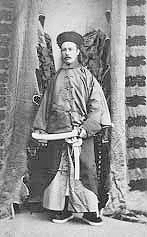 Charles Gordon as a tidu (Captain General).
Charles Gordon as a tidu (Captain General).
In the meantime a medal of distinction, accompanied by a donation of 10,000 taels, had been sent by imperial decree to Gordon in acknowledgmont of his services, and had been indignantly refused by that commander. At length such reparation as the case admitted of was done to the honour of Gordon by the publication of a proclamation by Li, in which he cleared Gordon of all knowledge of, or complicity in, his act, and explained the reasons by which he had been led to do what he did, reasons which induced even Gordon to take a more lenient view of the Governor's conduct than he had at first. The two men became close friends. Gordon recognized the ability and patriotism of the Governor, and Li clearly saw that he had for the first time in his life come in contact with a man of very rare type, whose distinguishing characteristic was perfect chivalrous disinterestedness. In mentioning that Gordon, on resuming operations, quickly trampled out the remaining embers of the rebellion, we may quote the following description of his demeanour on the field of battle: In almost all of these engagements Gordon found it necessary to be constantly in the front, and often to lead in person. The officers of his force were brave men enough, but were not always ready to face their desperate antagonists. Gordon, in his mild way, would take one or other of these by the arm, and lead him into the thick of the fire. He always went unarmed himself, oven when forward in the breach. He never recognised danger; to him a shower of bullets was no more than a hail-storm. He carried one weapon to direct his troops-he had but a little cane, and this soon won for itself the name of "Gordon's magic wand of victory." His Chinese followers, seeing him always victorious, always foremost in the light, concluded that it was his wand that ensured him protection. The idea encouraged the over victorious army greatly, and was of more service to the young commander than all the armour he could have borne. His quiet undress uniform and absence of arms formed a striking contrast to " the buccaneering, brigand-like costume of the American officers, strapped, armed, and booted like theatrical banditti." At the finish of the war the Chinese government amply and generously acknowledged the great services Gordon had rendered to the empire by conferring on him the highest honours and dignities in its gift. Even the rebels showed that they had formed an equally high estimate of their victorious foe, whose clemency to the vanquished was at least as conspicuous as his military genius. From his own governmont he received one stop in the army and the appointment of commanding royal engineer at Gravesend. There he remained for six years, and endeared himself to the town by his charitable labours and his exertions on behalf of the education of boys of the poorer classes-always an energetic, restless worker, and a benefactor of his race. After a time the government, with the clumsy inaptitude so often shown by England in dealing with an extraordinary man, could find nothing better to do for a man who, at the age of thirty, had saved an empire than by sending this splendid soldier to the post of vice-consul on the Lower Danube. When we remember the work in rough warfare, or in equally rough administration of frontier territories, England always has on hand, this relegation of a brilliant soldier to work suited to a common official can only be matched by the appointment of the greatest poet of his age to gauge the casks of alewives and to watch the smugglers of the Solway. Fortunately for the interests of humanity, others had a greater estimate of the worth of Gordon than was displayed by the government of his country. In 1874 he was invited by the Khedive of Egypt to succeed to the post of Sir Samuel Baker as governor of the tribes of Upper Egypt. The Khedive proposed to give him £10,000 a year, but he declined to accept more than £2000. He made his way to his seat of government through a forlorn and desolated country, and soon showed the same resolute courage and strenuous energy he had displayed in crushing the Chinese rebellion. These qualities were now exhibited in struggling against natural difficulties, the impediments to transit, the vast distances across the horrible desert from one station to another, and also in contending against the determined hostility of all, from pashas downwards, who wore interested in the slave traffic it was his mission to suppress his numberless expeditions undertaken against one nest after another of the slave traders, the extraordinary fearlessness of the man was often shown. It was no uncommon occurrence for him to ride on alone in advance of his crawling force, and make his way single-handed into a don of ferocious robbers and insist on their submission.
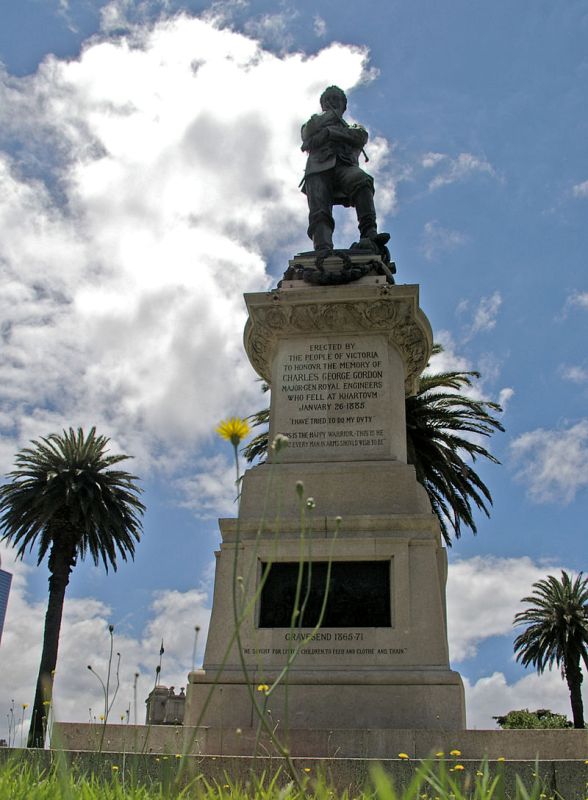 Says his present biographer, The work he had begun and was bent on finishing was fraught with peculiar perils. It demanded a tact, an energy, and a force of will almost superhuman. He had to deal not only with worthless and often mutinous governors of provinces, but with wild and desperate tribesmen as well ; he had to disband 6000 Bashi-Bazouks, who were used as frontier guards, Litt who winked at slave-hunting, and robbed the tribes on their own account; he had to subdue and bring to order, and rule the vast provines of the Bahr Gazelle, but now beneath the sway of great slaver Sebehr. It was a stupendous task, to give peace to a country Iuiaek with war; to suppress slavery among a people to whom the trade in human flesh was life, and lonouer, and fortune ; to make an army out of, perhaps, the worse material ever seen; to grow a flourishing trade and a fair revenue in the wildest anarchy in the world. The immensity of the undertaking; the infinity of details involved in a single step towards tics ; he countless odds to be faced; the many posts- the deadly climate, the horrible vermin, the ghastly itch, the nightly and daily alternation of overpowering heat and bitter cold-to be endured and overcome; the environment of bestial savagery and ruthless fanaticism, all these combine to make the achievement unique in human history.
Says his present biographer, The work he had begun and was bent on finishing was fraught with peculiar perils. It demanded a tact, an energy, and a force of will almost superhuman. He had to deal not only with worthless and often mutinous governors of provinces, but with wild and desperate tribesmen as well ; he had to disband 6000 Bashi-Bazouks, who were used as frontier guards, Litt who winked at slave-hunting, and robbed the tribes on their own account; he had to subdue and bring to order, and rule the vast provines of the Bahr Gazelle, but now beneath the sway of great slaver Sebehr. It was a stupendous task, to give peace to a country Iuiaek with war; to suppress slavery among a people to whom the trade in human flesh was life, and lonouer, and fortune ; to make an army out of, perhaps, the worse material ever seen; to grow a flourishing trade and a fair revenue in the wildest anarchy in the world. The immensity of the undertaking; the infinity of details involved in a single step towards tics ; he countless odds to be faced; the many posts- the deadly climate, the horrible vermin, the ghastly itch, the nightly and daily alternation of overpowering heat and bitter cold-to be endured and overcome; the environment of bestial savagery and ruthless fanaticism, all these combine to make the achievement unique in human history.
Right: Statue in Gordon Reserve, Melbourne, courtesy Peter Neaum.
Few readers of Mr. Hake's narrative, or of Gordon's own letters as given in the volume of 1)r. lill, will be disposed to think these words an exaggerated statement of this performances of Gordon. The whole story of his incessant battles with the slave dealers, his pursuing them from point to point, his shutting them off from the watering places, and thus forcing them to fight as an agency on his side, compelling them to come in and surrender, is one of the most romantic adventure over told. In his campaigning in these bitter deserts Gordon was admirably seconded by his brilliant lieutenant, Gessi, an Italian Garibaldian, he had thoroughly imbibed the spirit of his two great chiefs, and fought with a devoted, unwearied gallantry after Gordon's own heart. Many a great military reputation has been built up by deeds 0ot implying a tithe of the spirit and vigour and soldierly ability put forth by this brave Italian in the campaign in which he finally crushed the revolt of the slave-dealers and shot their chiefs. Ho gave his life to his task, and a few days before his death thus recapitulated his work. At the end of the war there were only burnt villages, abandoned or in ruins. The native had taken refuge in the jungle or in inaccessible forests. There remained not a single ox, a goat, or a fowl, at any price. I had the villages rebuilt. I constructed divans, storehouses, and a school, to which sheikhs now send their children for primary education, and which is frequented by over one hundred people belonging to the troops and the officers. I have facilitated communications by means of bridges or ferries over the rivers. I have restored to to their families over 10,000 slaves who had been torn from there and from cultivating the soil to be sold and taken to Shakla. I have destroyed all the slave trading establishments and have created agricultural colonies with the slaves."
Of course the departure of Gordon and the death of Gessi resulted in the destruction of the result of most of their labours. Of one of his expeditions Gordon wrote in words which might no doubt be applied to the whole of his hopeless work in the Soudan.
"I return," says he, " with the sad conviction that no good could be done in those parts, and that it would have been better had no expedition ever been sent." In concluding this notice we must refer to the journey undertaken by Gordon to China, in the crisis of the dispute between that empire and Russia, when war was believed on all hands to be imminent. He went on the invitation of his old colleague, Li-Hung Chang, with whom he had that difficulty after the taking of Soochow, and who now asked him to go to China as the best adviser the world could furnish him. Gordon's advise and influence were strongly exerted on the side of peace, and they no doubt weighed in securing that result. He also gave some wise counsel on the military organisation of China, which was followed to the letter-a singular fact when the jealousy entertained in China of all foreign examples and methods is remembered. Now, in a time of great emergency, Gordon is sent again to the Soudan. He makes his journey after his usual fashion, without an escort, and to judge from the telegrams--succeeds by his mere personal influence to pacify the country as lie advances. In the Soudan the memory of his rule is cherished as a fortunate time by the unhappy populations of those wild regions. A traveller riding through the Sudan after his departure found the people he had governed crying for his return "' as for that of one divine," and he is the one Christian for whom they offer yearly prayers at Mecca. Whether the invincible charm of success which has hitherto attended General Gordon in his great undertakings will remain unbroken in the present crisis time must determine; but whatever happens we may be sure that his part will be worthy of one of the most illustrious reputations and most strongly-marked individualities of the present generation. CHINESE GORDON. (1884, March 1). Goulburn Herald (NSW : 1881 - 1907), p. 2. Retrieved from http://nla.gov.au/nla.news-article103507359
The Advance on Tamai.
An official report from Lieutenant-General Sir G. Graham on the Tamai operations has been addressed to the Secretary of State for War, and the Colonial Secretary has favoured us with a copy of the same. It is interesting as being descriptive of the principal movement in which the New South Wales troops took part, and as showing the positions they occupied during the advance and while the army rested in zareua. The following are the principal portions of the General's report : —
'Suakim, April 8, 1885.
My Lord,— As I have already reported to your Lordship, having received information from a reconnaissance made on the 1st April that bodies of the enemy were still occupying Tamai, I decided to advance on that place on the. 2nd instant and attack Osman Digna in his chosen position, although it had been ascertained that there was some doubt whether he would accept battle, notwithstanding his proclamation and his endeavours to impose upon his followers by asserting the power of his arms.' The troops as per margin paraded at 3 a.m. on the 2nd April near the left water fort, and were drawn up in a rectangular formation, which, for the sake of brevity, will be referred to as the 'square,' although it was actually an oblong, with sides about 600 yards by 200 yards.' In the front face were three companies of the Coldstream Guards, the remaining companies being on the left face; on the right face were the Scots Guards, the East Surrey Regiment, and the 28th Bombay Native Infantry. On the left face were five companies of the Coldstreams, the Marines, and the Shropshire Regiment, the 15th Sikhs taking the rear face. The four companies of the New South Wales Battalion (Guards Brigade) were at first Corps. Officers. N-Men. and Horses. Head-Quarter Staff ; 40 50 522nd Bn. Coldstream Guards and Staff; ... 29 7-43 10.2nd Bn. Scots Guards ? 29 713 8 Australian Infantry; 21 489 82nd Bn. East Surrey Regiment - ... 16 593 8 Royal Marine tight Infantry ... 27 474 8 Shropshire Light Infantry; 23 G48 717th Company Royal Engineers ... 4 101 5 Sikh Company Royal Engineers ... 1 42 C .Royal Horse Artillery -and Royal Artillery ... ... - ... '... 24 324 154 Cavalry Brigade ; 1 743 773 Indian Contingent; ... 25 1585 24 Medical Corps'; 16 164 22 Commissariat and Transport Corps 16 200 16 Balloon Detachment... 2 15 10 Pptal... placed in reserve on either face of the square, but were afterwards brought into line. The two (screw) 7-pr. mountain guns on mules, and the two 7-pr. (200lb.) mountain guns in draught, with the Rocket Troop, and four Gardner(runs, were in rear inside the square. The Madras Sappers were in rear of the 28th Bombay, and the 17th Company Royal Engineers in rear of the left face. The Ambulance waggons, litters, and dandies, with the two field hospitals, were in the front portion of the ulterior space.' The formation of the Convoy strength as per margin, f and posting it in its proper position in column in the square, necessarily occupied some time, and the difficulties were increased by the darkness, the moon being obscured by clouds.'
The square moved off at 4 o'clock, and were joined by the Cavalry and G Battery B Brigade Royal Horse Artillery, which had paraded at daybreak. ' The battery was placed inside the square, in rear of the front face, and the Cavalry were sent out well in advance, two squadrons of the 9th' Bengal Cavalry covering the front and part of both flanks of the Force with scouts and advanced parties, the right flank and right rear being protected by the two squadrons 5lh Lancers, and the left flank and rear by the two squadrons 20th Hussars.' The square advanced steadily through the bush, although frequent halts were necessary to re-adjust or shift the loads of the transport animals. A proportion of spare camels was ordered to remain in rear, and the senior Transport officer was directed to station himself there, under the orders of Brigadier-General Hudson, who was in command of the rear Coldstream Guards...15th Sikhs.+ 1639 camels, with provisions and water (14,500 gallons) ; 930 mules, with ammunition, hospital equipment, entrenching tools,fee. ; 1773 followers.t 5th Lancers, two squadrons; 20th Hussars, two squadrons: 9th Bengal Cavalry; G Battery B Brigade Royal Horse Artillery, ...
'Zareba No. 1, six miles from the left water fort, was reached at 9 a.m., and the force halted until 10.15 a.m. to rest the men and enable them to take food. During this time arrangements had to be made for the occupation and defence of the zareba, at which were left the 28th Bombay Native Infantry and two Gardner guns, manned by the Royal Marine Artillery. The balloon was filled and made ready for use for reconnaissance purposes. The force was joined by the Grenadier Guards, the Berkshire Regiment, the 24th Company Royal Engineers, and two Gardner guns, Royal Navy ; and by the Mounted Infantry and one troop 9th Bengal Cavalry, which had reconnoitred towards Tamai on the previous day.'
At 10.15 a.m. the march was resumed with the force as per margin,} the square being re-formed — three companies of the Grenadier Guards being placed in the front line.' The square advanced slowly with frequent halts, owing to the density of bush in the neighbourhood of the zareba.' At 12.15 p.m., about three miles from Zereba No. 1, the cavalry and mounted infantry reported the presence of the enemy in the bush in scattered groups, a few being on camels and the main portion on foot. These appeared to beat first advancing through the bush, but gradually foil back before the advance of the Cavalry.' At 12.45 p.m. the force halted for a short time, and at 1.30 p.m. the enemy were reported as retiring towards the Teselah Hills and Tamai. At 2 p.m., about three miles from the Teselah Hills the force halted for water and food, and the Mounted Infantry and a squadron of the 9th Bengal Cavalry were ordered to reconnoitre the position on these hills reported to be lined with the enemy.' At first, the enemy seemed inclined to defend the Corps. Officers N-me and Horses. Head-Quarter Staff ; 40 50 523rd Bn. Grenadier Guards 25 663 92nd Bn. Coldstream Guards and Staff; 29 7.43 , 2nd Bn. Soots Guards; 29 713 8 New South Wales Infantry; 21 489 82nd Bn. East Surrey Regiment ... 16 593 8 Royal Marine light Infantry ... 27 474 8 Shropshire light Infantry 23 618 71st Bn. Berkshire Regiment and Staff ? 23 628 717th Company Royal Engineers ... 4 101 524th Company Royal Engineers ... 3 121 10 Royal Horse Artillery and Royal Artillery; 24 318 154 Cavalry Brigade; 50 974 1006 Naval Brigade; 4 17 Indian Contingent19 853 17 Medical Staff Corps; 19 184 26 Commissiariat and Transport Corps 19 214 16 Balloon Detachment 2 15 10 Tow.,, ...... J 8?r I 7m Aim position, but their flanks being threatened, they fell back on Tamai. '
' The Mounted Infantry were ordered to push on to the village, find out if it was occupied, and then, if practicable, move on to the water, and water the horses. One company advanced about a mile south through a village, when fire was opened on them from another village further south ;while the company moving towards the water in the Khor Ghoub were fired upon by the enemy on the ridges near. The fire was returned, and the Mounted Infantry fell back to the Teselah Hill, where they were ordered to join the Cavalry, and return to zereba for the night.' The main body of the force arrived at the Teselah Hills at about 5 p.m., and the following dispositions were ordered : — .' A zereba about 300 yards square, with the troops occupying it as shown in the margin, tt ^as at once formed in the valley between the hills. Four companies of the Grenadier Guards occupied one hill, and three companies of the Scots Guards and one company New South Wales Infantry another, where two Horse Artillery 13-pr. Guns were posted, the horses being placed in the zereba below. The left hill was occupied by the Shropshire Regiment and two Horse Artillery 13-pr.guns, while the East Surrey Regiment occupied' a hill to the right flank.' The position was a very strong one, and the rapid way in which the defences were constructed reflects great credit on the troops.
' Everything was complete before dark, and rations and water were served out.'
On the 3rd April, at about 1 a.m., shots were fired into camp from about 800 to 1000 yards.' The moon shone ... fire answered by a volley from the Grenadier Guards. This and a shrapnel shell from one of the 13-pr. Horse Artillery guns silenced the enemy in about 10 minutes ; but our lot was, I regret to say, one killed and two wounded. The loss of the enemy could not be ascertained, as they were... Coldstream Guards. Grenadier Guards ... Sikhs .. able to remove any killed or wounded under cover of the night.' The rouse was sounded at 4.30 a.m., and the following dispositions were ordered :— The East Surrey and Shropshire Regiments with the Gardner guns occupying the defensible posts on the right and left hills, to remain in the zereba under Major-General Sir J. M'Neill for the protection of the transport. The transport animals were subsequently moved by Sir J. M'Neill to the front line of the zereba, and a small work was constructed in one of the rear corners of the zereba and occupied by two Gardner guns and two companies of Infantry.' The main body to form up in front of the zereba towards Tamai in the following order : —' The 2nd Brigade (Berkshire Regiment, Marines, and 10th Sikhs), under Brigadier- General Hudson, in front ;the Marines, in columns of companies, on the right ; the Berkshire Regiment, deployed in line, in the centre ; and the 15th Sikhs, in columns by companies, on the left.' The Guards Brigade to form in line of column in rear ....' The guns G Battery B Brigade, Royal Horse Artillery, were to take post on the right flank ; the mountain guns to take post in rear of the right company of the Berkshire: the Rocket Battery and Ammunition Column in rear of that regiment ; the Madras Sappers and JJearer Company in rear of the left.' The troops formed up in this order and advanced upon Tamai at 8 a.m. The Cavalry and Mounted Infantry, which had arrived from No. 1 Zereba at 7.20 a.m., were directed to reconnoitre for the enemy, and cover the advance.' My object was to gain possession of the cluster of villages at New Tamai, which have so long been the headquarters of Osman Digna, and to occupy the water supply, by attacking the position of the enemy, or by drawing them. ?into an engagement on the more open ground near the villages.' It was soon evident that the enemy were unable to oppose any serious resistance to the advance of the force.' Fire was opened on the Mounted Infantry and 9th Bengal Cavalry about 8.43 a.m., from the east side of the ravine, and soon afterwards from the gullies to the south.' The advance of the force was continued through the villages, which were found to have been recently deserted, the lines of the leading brigade occasionally forming fours deep, or advancing by fours from a flank to pass through bushes and huts, until at 9.30 a.m., the crest of the north side of the Khor Ghoub was gained.' The Mounted Infantry and 9&. Bengal Cavalry were at this time engaged with the enemy on the right flank, but were unable to draw them from their position.' I now ordered the leading (2nd)Brigade, under General Hudson, to descend the khor, inclining to the right, so as to avoid a steep hill immediately in front, which was occupied by a company of the 15th Sikhs.
'The Brigade moved to its right, advanced across the khor, which was at this point about 100 feet deep, and 400yds. wide, and ascended the hill on the opposite bank. The Berkshire Regiment was posted on the highest point in the centre, the Marines on the right, with their right thrown back, while the 15th Sikhs crowned the heights on detached hills to the left front and left.’ The Berkshire Regiment opened fire on the enemy, marksmen were thrown out about 30 yards in front of the Marines, and the Scots Guards, who had advanced into the khor in reserve, threw out a company to fire up the khor on their right. The Guards Brigade and New South Wales Batallion moved forward in support of the 2nd Brigade, crowning the ridges on the north side of the khor. The G Batt. B Brig., Royal Horse Artillery, came into action on the left flank of the 1st Brigade, and opened fire on some parties of the enemy.' During those operations the enemy were keeping up a distant fire, which resulted in the casualties I have already reported by telegraph — viz., one man killed, one officer and 15 men wounded. The enemy's numbers and loss it is impossible to estimate with any accuracy, but a steady well aimed fire was kept up on such bodies as showed themselves, and the effect of the fire was to overcome any opposition they may have intended to make.' On descending to the bed of the khor, I found that at the spot, where last year we had found running water, there were no signs of water beyond a little moisture, and well holes partly filled in. By digging about four feet down a email supply of braikish water could have been obtained, and at a short distance there was a shallow pool of water on abed of black fetid mud.' In view, therefore, of the retirement of the enemy, and their evident inability or indisposition to meet the force under my command, it appeared to me to be best to withdraw, as it would have been fruitless to attempt to follow Osman Digna into tho mountainous country with no water for my transport animals.' At 12 noon the force reached No. 2 Zareba at the Teselah Hill. 'The force was under arms, and on the' march for 16 hours on the 2nd, and for 13|hours on the 3rd, marching about 13 miles on the first day at a slow pace through bush and -in deep sand, and 12 or 13 miles on the 3rd.The camels could not be supplied with water on these days, and the mules received a very limited quantity. Notwithstanding this there was only .six casualties altogether (three mules .and three camels), and two of these were from the enemy's fire. Of 1257 horses, 710 mules, and 167 camels (Cavalry, Artillery, and transport together), only 42 horses, 7 mules, and 60 camels are on the sick list, and this fact reflects much credit on the officers of Cavalry, Artillery, and transport who had the care of these ...' I have already informed your lordship of the remarkable steadiness and energy with which the troops marched and worked under great stress. Throughout these operations officers and men displayed the utmost cheerfulness, and their perfect steadiness on the march and under fire, which, though distant, caused _some loss, was everything that could be desired. The number of men who fell out on the march was only 11, which fact bears witness to the spirit and physical capabilities of the troops, while the number (33) on the sick list at the end of the operations is very small, considering the largeness of the force and the great fatigue and privations which had to be undergone by all.
' As I have already reported, the New South Wales Contingent bore themselves admirably on the march and under fire, and, both by the report of the General Officer commanding the Guards Brigade and from my own observation, I can testify to the soldier-like spirit and endurance shown by her Majesty's colonial forces.' I have, &c,'Gerald Graham, Lieut. -General,' Commanding Suakim Field Force.' The Right Hon. the Marquis of Hartington.' The Advance on Tamai. (1885, July 18). The Sydney Mail and New South Wales Advertiser (NSW : 1871 - 1912), p. 122. Retrieved from http://nla.gov.au/nla.news-article162820011
RECEPTION OF THE SOUDAN CONTINGENT.
THE following is the address delivered by the Governor of New South Wales to the Soudan volunteers :
Soldiers,-On behalf of her Majesty the 'Queen and the people of this country, I offer you her thanks and their welcome on your return to the colony. We rejoiced at the privilege of sending you on the service for which yon were despatched. Our joy is greater on receiving you back again, after having performed that service to the credit of the country, to the entire satisfaction of the Imperial officers under whom you were faced, and to the advantage of the Empire.
It has been not the least gratifying circumstance in the history of our enterprise that you have not been called to exercise in any bloody engagement the courage and devotion which prompted you to volunteer for the defence of the Empire. While this has been doubtless a source of disappointment to you, it is a subject for our gratitude to Heaven. All the duties that were laid upon you, you discharged with the instant obedience of good soldiers and with the alacrity of gallant men. In the desire to distinguish you in an especial manner, you were associated with those chosen soldiers of the Empire, the story of whose exploits are inextricably interwoven with some of the most glorious passages of our military history. They received you with respect, labored by your side in your short campaign, and would have gladly and confidently shared with you the glory of conflict. You have come back to us more capable by experience and by discipline of securing our defence, because the military strength of a body of troops depends not so much on its mere numerical power as on the special completeness of training of each member constituting the force. By your appearance and conduct in Egypt you have done good service to the Empire. The world had not imagined that such an act as this which you have performed was within the range of our resources and patriotism. It is six-and twenty years ago- on the 26th of January, 1859 - that a great English statesman, a great orator, and one of the greatest of English men of letters of this age, said at a public banquet in Loudon, in speaking of these Australian colonies, these simple and memorable words:-" It may happen that the time will arrive when the other great Powers of the whole world will rise up against the venerable parent of so many noble children. If that period should ever arrive, I believe the colonies will not be unmindful of the tie that binds them to the mother country. I believe that their vessels will come thick and fast across the ocean to her assistance, and that a voice will be heard, universally among them saying in effect, "While Australia lasts England shall not perish!"
Your action has, as far as the sympathy of the colonies is concerned, made the late Lord Lytton's hopeful words a prophecy. For purposes of defence there has been practically now established an Imperial federation. And your example has inspired your own countrymen with so much enthusiasm that you find thousands of newly enrolled soldiers to welcome your return, to reward your devotion by their sympathy, and to share with you in the labour of the general defence. They will honour you for your service, benefit by your instruction, and some day emulate your example.
Soldiers, I welcome you back to your wives, your families, and to the gratitude of the country; and may the blessing of Almighty God ever attend you and them in all your employments. Before you leave the ground, I call upon you to give three cheers for her Majesty the Queen.
- The address was loudly applauded by those present.
Colonel Richardson then replied as follows:
Your Excellency,-I thank you on behalf of the soldiers whom I have the honor of commanding for the welcome you have given us in the name of her Majesty and the people of this colony on our return from Egypt It has not been our good fortune to enjoy the opportunities of service which we desired, and which, when your Excellency wished us " good-bye" on leaving the colony, we hoped we should have. But I may say for the fine body of men entrusted to my command that in cheerful obedience to authority, in the willingness to discharge any soldierly duty, and is their disappointment that the course of events deprived them of the honor most prized by brave men, they did no discredit to the service of the Queen, or the honor of the colony. From our landing to our departure the picked troops of the Empire were our companions. This was an honor intended, my lord, for the country which sent as; but I can say for the men under my command that they did nothing to make England regret conferring such a distinction upon them, or to cause you to be ashamed of them. I can say no more, except to thank you, my lord, for your generous expressions of welcome, and through you to thank the country for sending us on a service of honor in which it was not our fault that we did not reap for the credit of the colony a larger share of glory. RECEPTION OF THE SOUDAN CONTINGENT. (1885, July 1).Western Star and Roma Advertiser (Toowoomba, Qld. : 1875 - 1948), p. 3. Retrieved from http://nla.gov.au/nla.news-article102732026
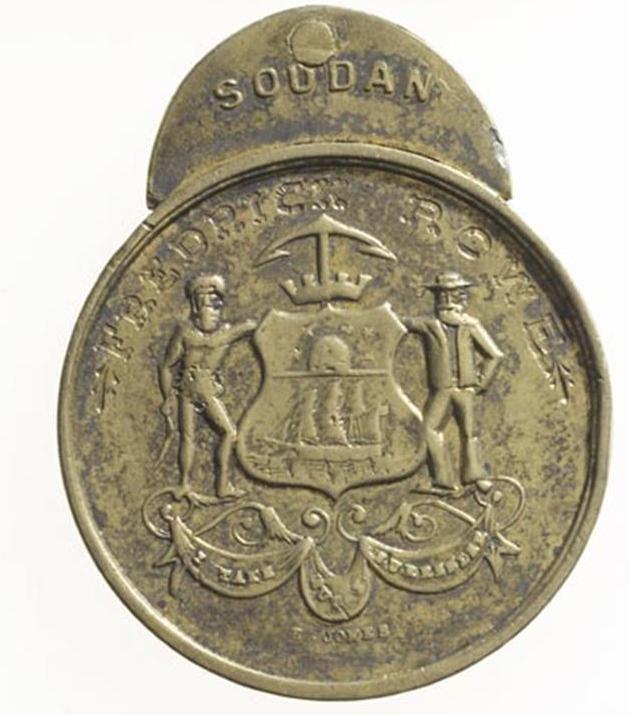
This medal was issued by T. Playfair, Lord Mayor of Sydney from 1875 to 1893. It was presented to each member of the contingent which fought in the Soudan, who were expected to engrave their own name, number or insignia on the medal. Fredrick Rowe engraved his name on this medal. Rowe was born in St Georges, Somerset, England, in 1865. He moved to Australia some time in his youth, and became a labourer. He enlisted to fight in the first war to which colonial Australia had formally sent a force, the Soudan conflict. Rowe enlisted on 01/10/1883 at 18 years 11 months, and embarked on 03/03/1885. He returned to Australia on 23/06/1885 aboard the SS Arab. Inscriptions: Plain (edge) SOUDAN (on tab); I TAKE BUT I SURRENDER/E.JONES; Engraved FREDRICK ROWE above Aborigine and European who hold a shield between them (obverse) .PRESENTED BY THE CITIZENS OF SYDNEY./ T.PLAYFAIR. MAYOR,1885 around wreath; within: engraved NSWA (reverse)
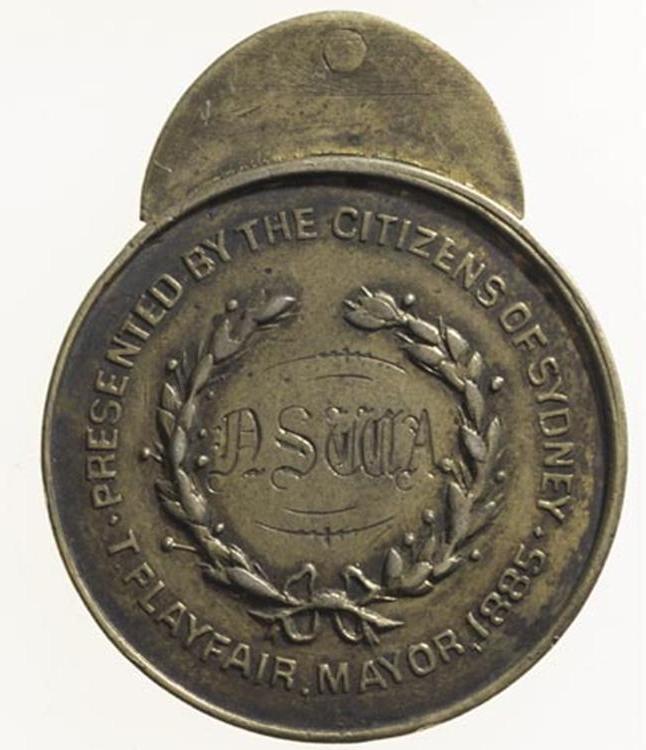
Interstate pique and rivalry (?) plus an indication of the opposition some people felt, as mentioned above. There was widespread opposition to the NSW Continent and many of the 'against' articles referred to the fact that this was the first paid for by the government of NSW fighting force, citing the costs involved of the guns, ships etc.:
That Soudan Contingent. THE burst of patriotism in New South Wales is over, and now the cost has to be counted—not the pecuniary cost, mark you, but the cost in revulsion of feeling about the whole affair. After historians will have a pitiful tale to record. Fired, one by temporary enthusiasm, another by a desire for knighthood, and another because he dared not swim against the stream, a contingent was sent to the Soudan, and the only real wound sustained was that which a Sydney reporter inflicted upon himself by allowing his pistol to go off while he was drawing it, and lodging the contents in his leg. Now the real catastrophe is at hand. The contingent got a cheap trip to Egypt, and returned without striking a blow. They went to fight and didn't fight, and people over there were disgusted. Colonel Richardson cannot even show a sabre cut anywhere about his body, and yet the little bauble of patriotism, or so-called patriotism, cost a pretty penny. Now the ministry has fallen. Mr. Alexander Stuart was knighted, and the honour seems to have weighed so heavily upon him that he has never been well since. Mr. Dalley, who has spoken at times as if New South Wales were a sort of second Ireland in the Southern seas, is also thinking of retiring. And all this trouble arises because military exploit was a big term, and tickled the ears of New South Welshmen. That Soudan Contingent. (1885, October 8). Melbourne Punch(Vic. : 1855 - 1900), p. 7. Retrieved from http://nla.gov.au/nla.news-article174566368
Photojournalism
The practice of illustrating news stories with photographs was made possible by printing and photography innovations that occurred in the mid 19th century. Although early illustrations had appeared in newspapers, such as an illustration of the funeral of Lord Horatio Nelson in The Times (1806), the first weekly illustrated newspaper was the Illustrated London News, first printed in 1842. The illustrations were printed with the use of engravings.
During the Crimean War, the ILN pioneered the birth of early photojournalism by printing pictures of the war that had been taken by Roger Fenton. Fenton was the first official war photographer and his work documenting the effects of the war on the troops, laid the groundwork for modern photojournalism. Other photographers of the war included William Simpson and Carol Szathmari. Similarly, the American Civil War photographs of Mathew Brady were engraved before publication in Harper's Weekly. Disaster, including train wrecks and city fires, were also a popular subject for illustrated newspapers in these early days.
The printing of images in newspapers remained an isolated occurrence in this period - photos were used to enhance the text rather than to act as a medium of information in its own right. This began to change with the work of one of the pioneers of photojournalism, John Thomson, in the late 1870s. In collaboration with the radical journalist Adolphe Smith, he began publishing a monthly magazine, Street Life in London, from 1876 to 1877. The project documented in photographs and text, the lives of the street people of London and established social documentary photography as a form of photojournalism. Instead of the images acting as a supplement to the text, he pioneered the use of printed photographs as the predominant medium for the imparting of information, successfully combining photography with the printed word.
On March 4, 1880, The Daily Graphic (New York) published the first halftone (rather than engraved) reproduction of a news photograph. In 1887, flash powder was invented, enabling journalists such as Jacob Riis to photograph informal subjects indoors, which led to the landmark work How the Other Half Lives. By 1897, it became possible to reproduce halftone photographs on printing presses running at full speed.
In France, agencies such as Rol, Branger and Chusseau-Flaviens (ca. 1880-1910) syndicated photographs from around the world to meet the need for timely new illustration. Despite these innovations, limitations remained, and many of the sensational newspaper and magazine stories in the period from 1897 to 1927 were illustrated with engravings. In 1921, the wirephoto made it possible to transmit pictures almost as quickly as news itself could travel.
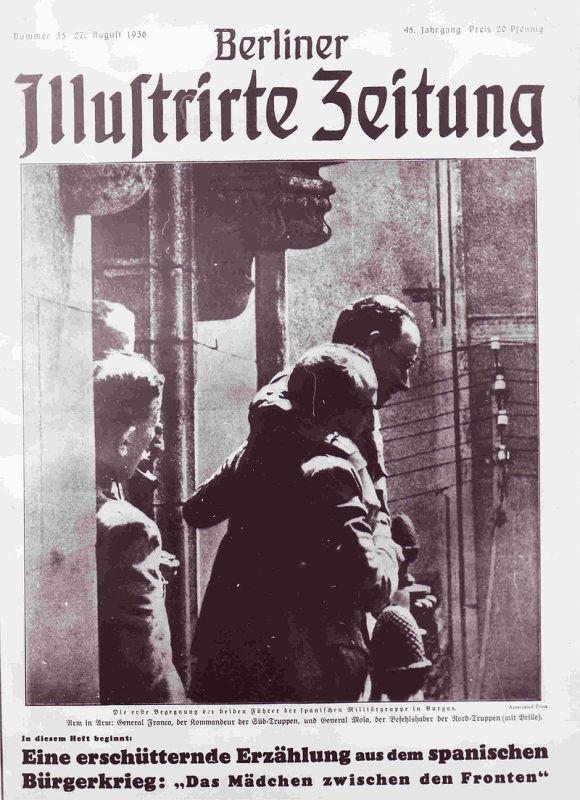 The "Golden Age of Photojournalism" is often considered to be roughly the 1930s through the 1950s. It was made possible by the development of the commercial 35mm Leica camera in 1925, and the first flash bulbs between 1927 and 1930 that allowed the journalist true flexibility in taking pictures.
The "Golden Age of Photojournalism" is often considered to be roughly the 1930s through the 1950s. It was made possible by the development of the commercial 35mm Leica camera in 1925, and the first flash bulbs between 1927 and 1930 that allowed the journalist true flexibility in taking pictures.
Right: The Berliner Illustrirte Zeitung pioneered modern photojournalism and was widely copied. Pictured, the cover of issue of 26 August 1936: a meeting between Francisco Franco and Emilio Mola.
A new style of magazine and newspaper sprung up that used photography more than text to tell their stories. The Berliner Illustrirte Zeitung was the first to pioneer the format of the illustrated news magazine. Beginning in 1901, it began to print photographs inside the magazine, a revolutionary innovation. In the successive decades, it was developed into the prototype of the modern news magazine. It pioneered the photo-essay, had a specialised staff and production unit for pictures and maintained a photo library. It also introduced the use of candid photographs taken with the new smaller cameras. The magazine sought out reporters who could tell a story using photographs, notably the pioneer sports photographer Martin Munkácsi, the first staff photographer, and Erich Salomon, one of the founders of photojournalism.
Until the 1980s, most large newspapers were printed with turn-of-the-century "letterpress" technology using easily smudged oil-based ink, off-white, low-quality "newsprint" paper, and coarse engraving screens. While letterpresses produced legible text, the photoengraving dots that formed pictures often bled or smeared and became fuzzy and indistinct. In this way, even when newspapers used photographs well — a good crop, a respectable size — murky reproduction often left readers re-reading the caption to see what the photo was all about. The Wall Street Journal adopted stippled hedcuts in 1979 to publish portraits and avoid the limitations of letterpress printing. Not until the 1980s had a majority of newspapers switched to "offset" presses that reproduce photos with fidelity on better, whiter paper.
Photojournalism. (2015, July 3). In Wikipedia, The Free Encyclopedia. Retrieved from https://en.wikipedia.org/w/index.php?title=Photojournalism&oldid=669816446
One of the first photographs used in an Australian newspaper, instead of the former making engravings for printing, was of a train incident at Young in 1888.:
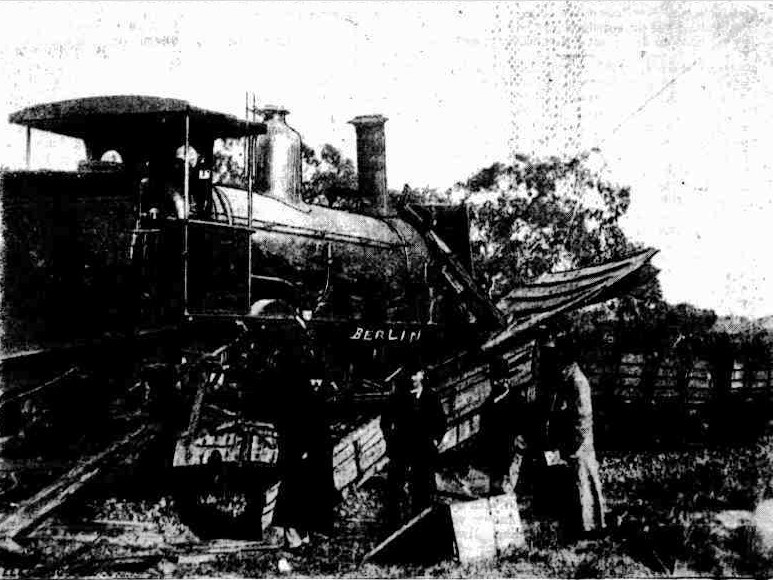
THE RECENT, RAILWAY ACCIDENT AT YOUNG.-[See Page 569.] (From a photo. by Mr. Berlin Youug.) No title. (1888, September 15). The Sydney Mail and New South Wales Advertiser (NSW : 1871 - 1912), p. 558. Retrieved from http://nla.gov.au/nla.news-article161888035
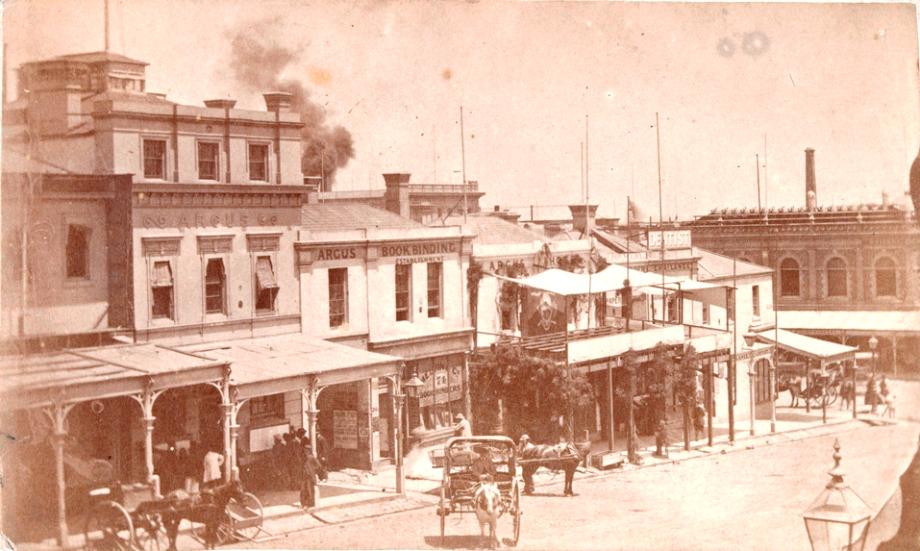
Melbourne's The Argus, first edition published on 2 June 1846, on 28 July 1952, claimed it had become the first newspaper in the world to publish colour photographs in a daily paper. Above: The Argus Office, at 76 Collins Street East, Melbourne, 1867. Photo by Thomas Foster Chuck 1826-1898, photographer. Image No.: H11646. Image courtesy State Library of Victoria.
130th Anniversary of Australia’s Sudan Contingent - threads collected and collated by A J Guesdon, 2015.